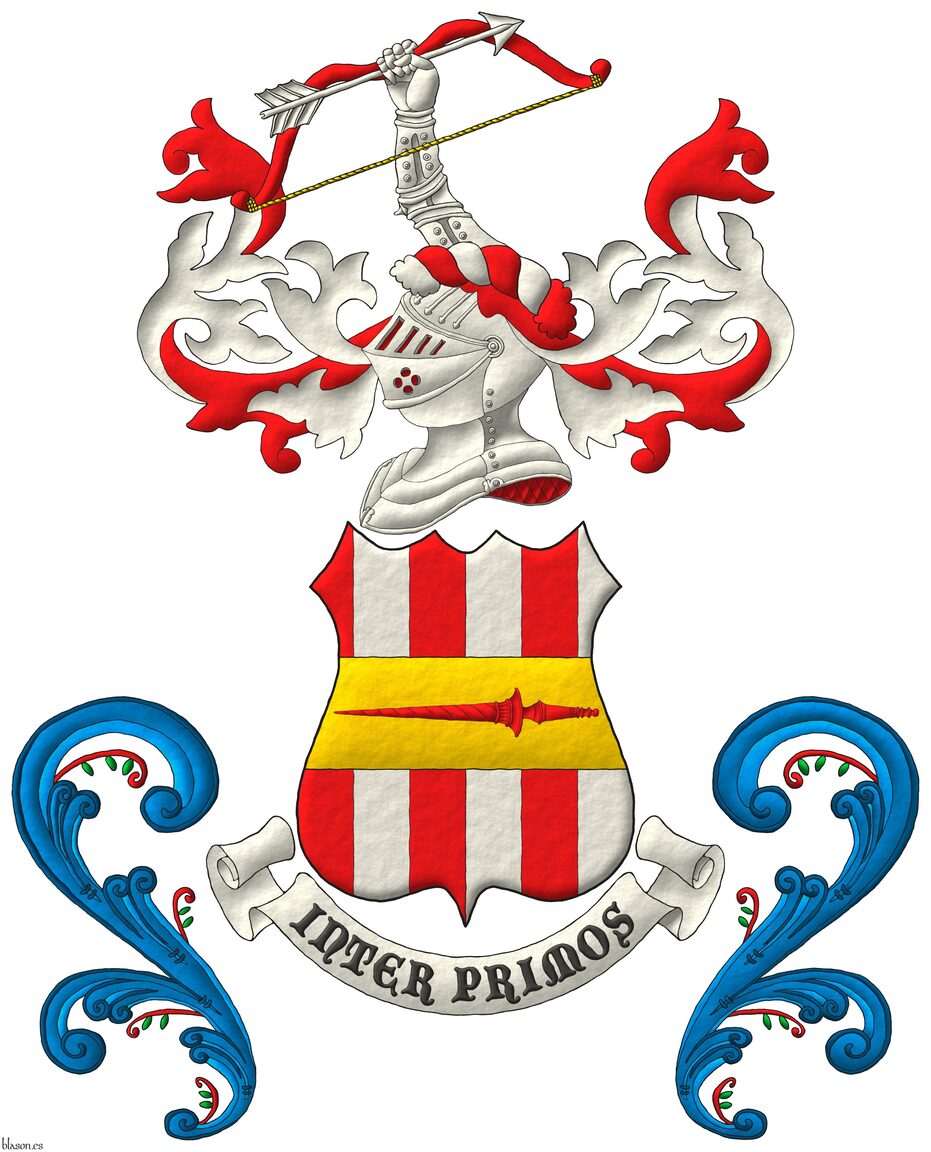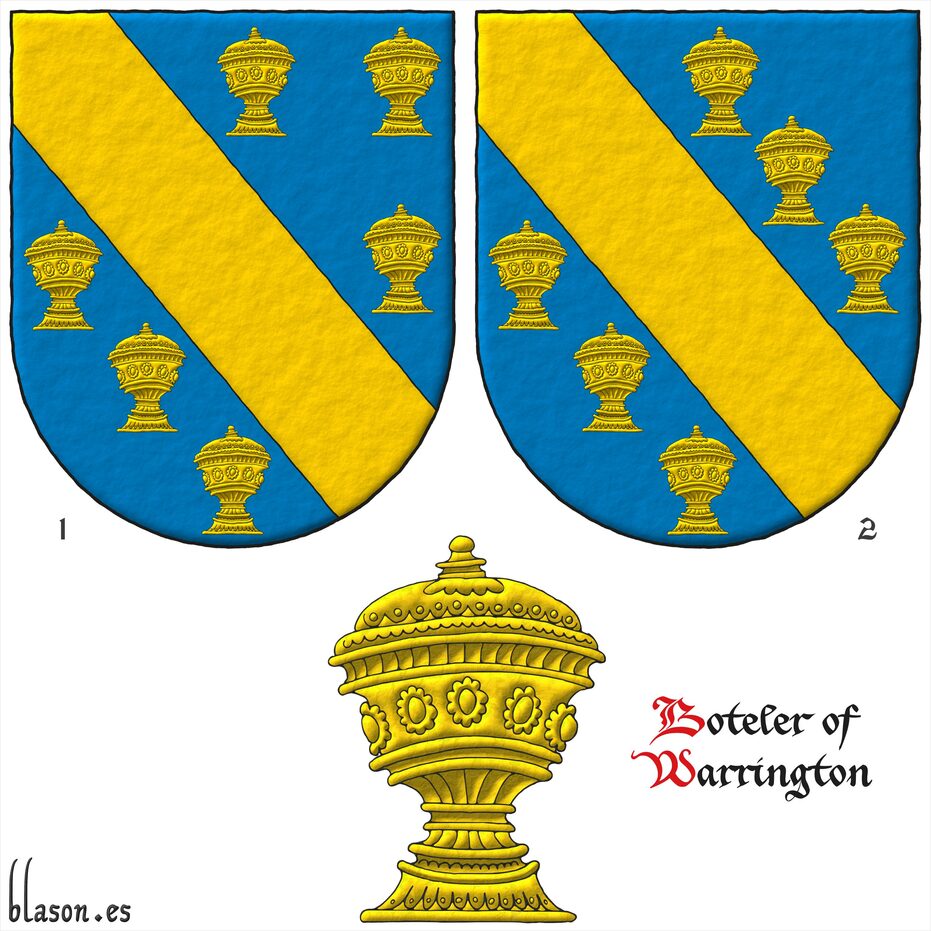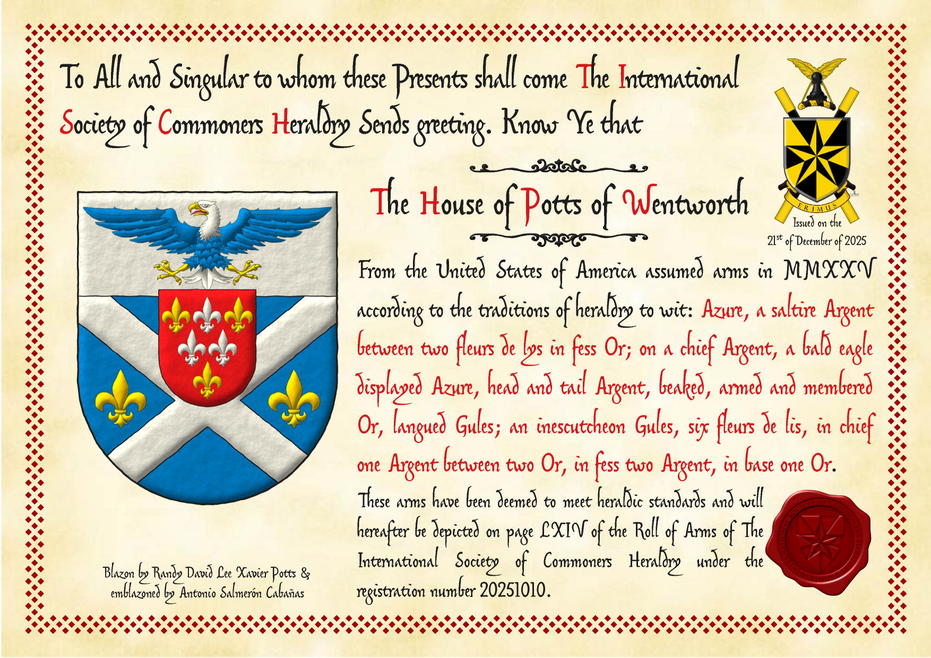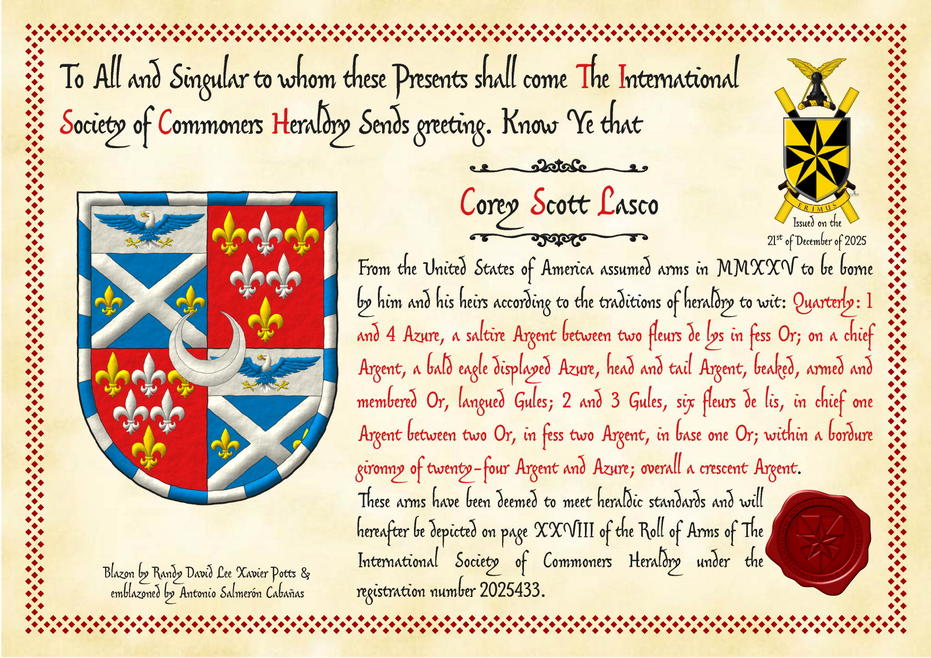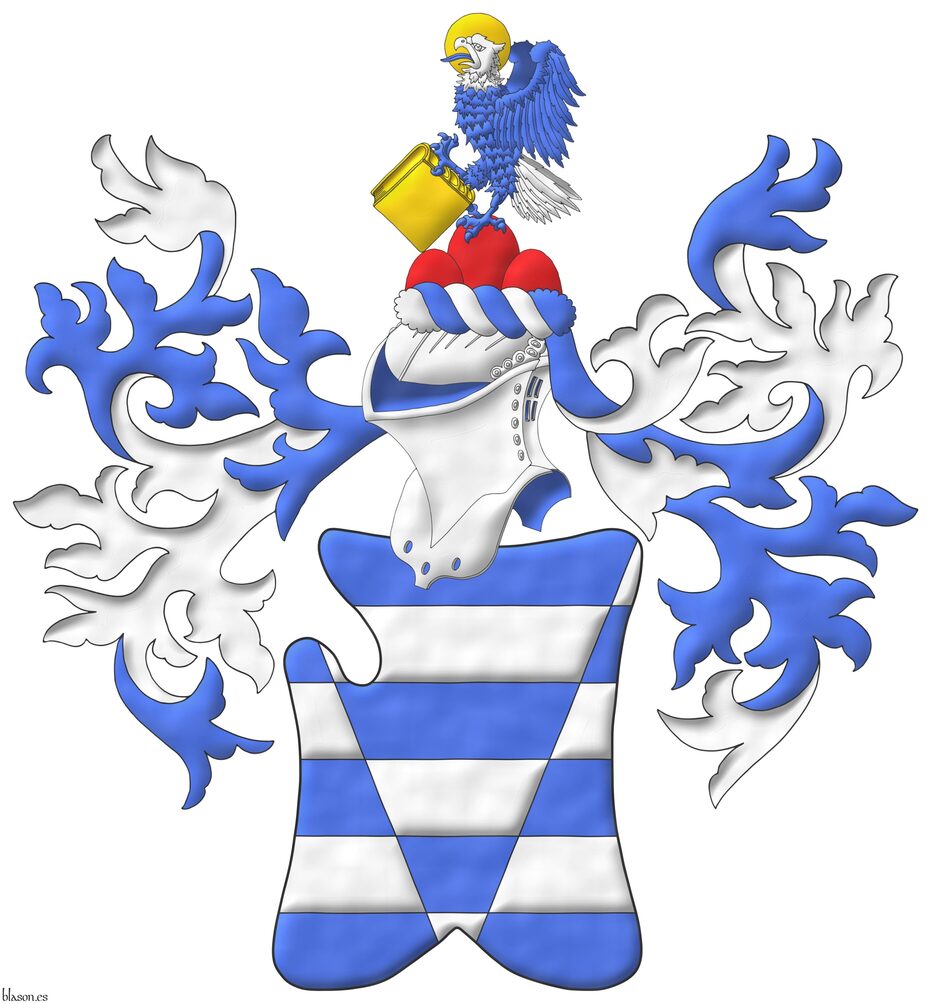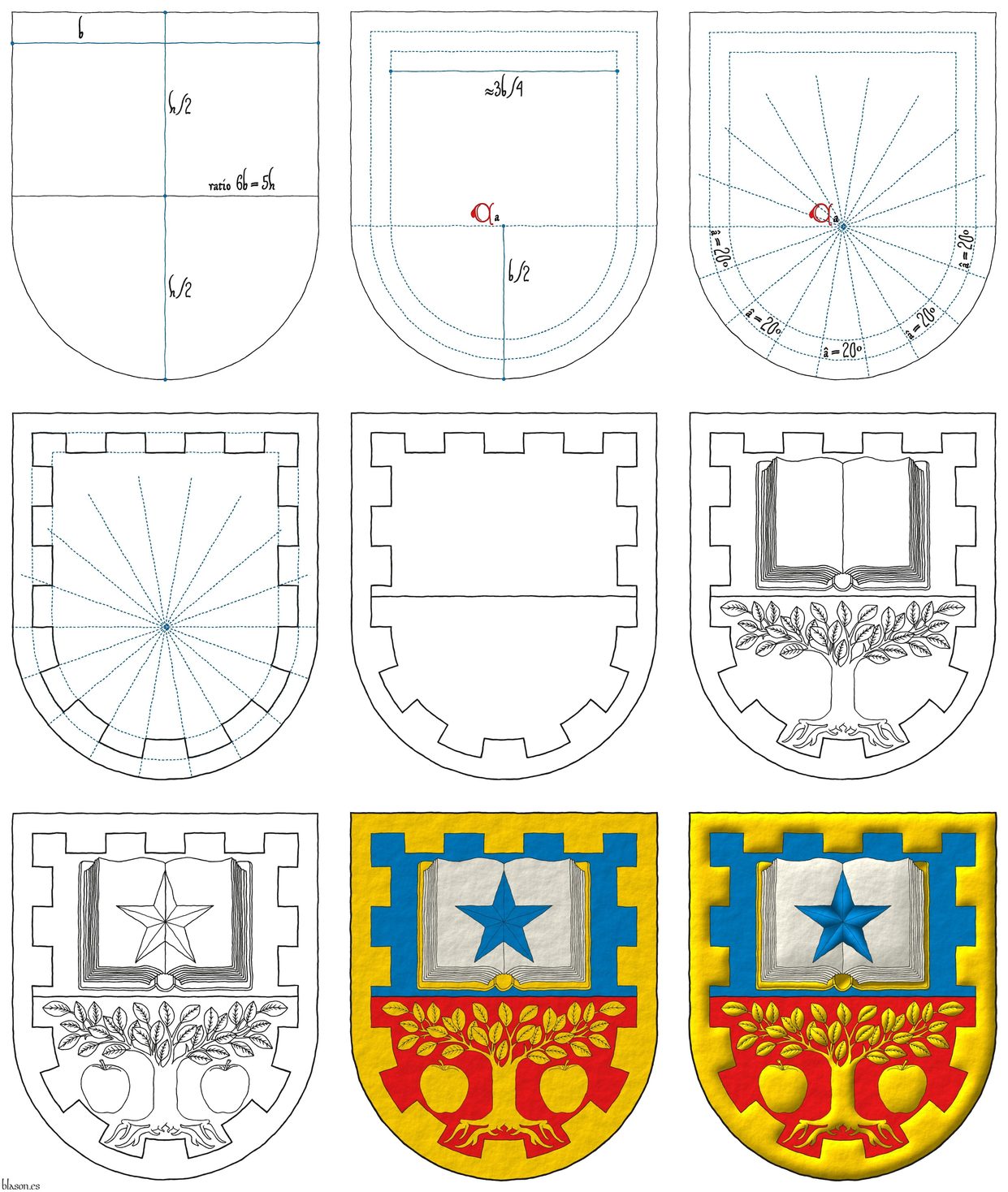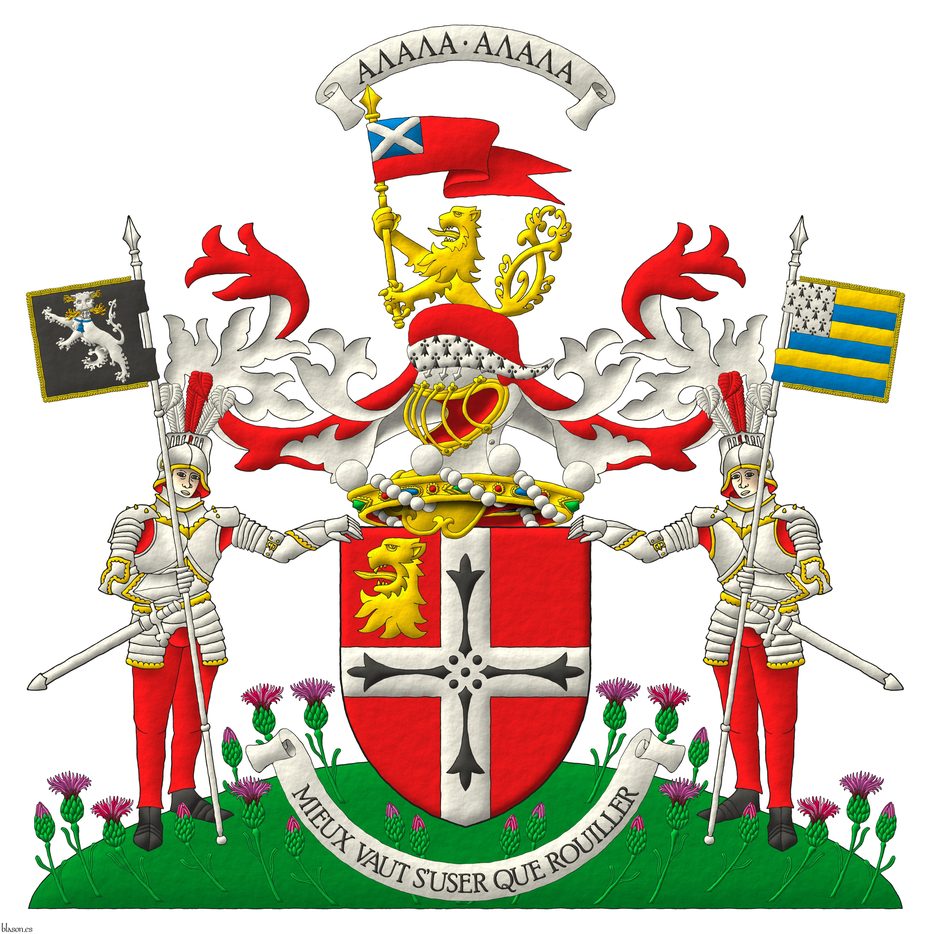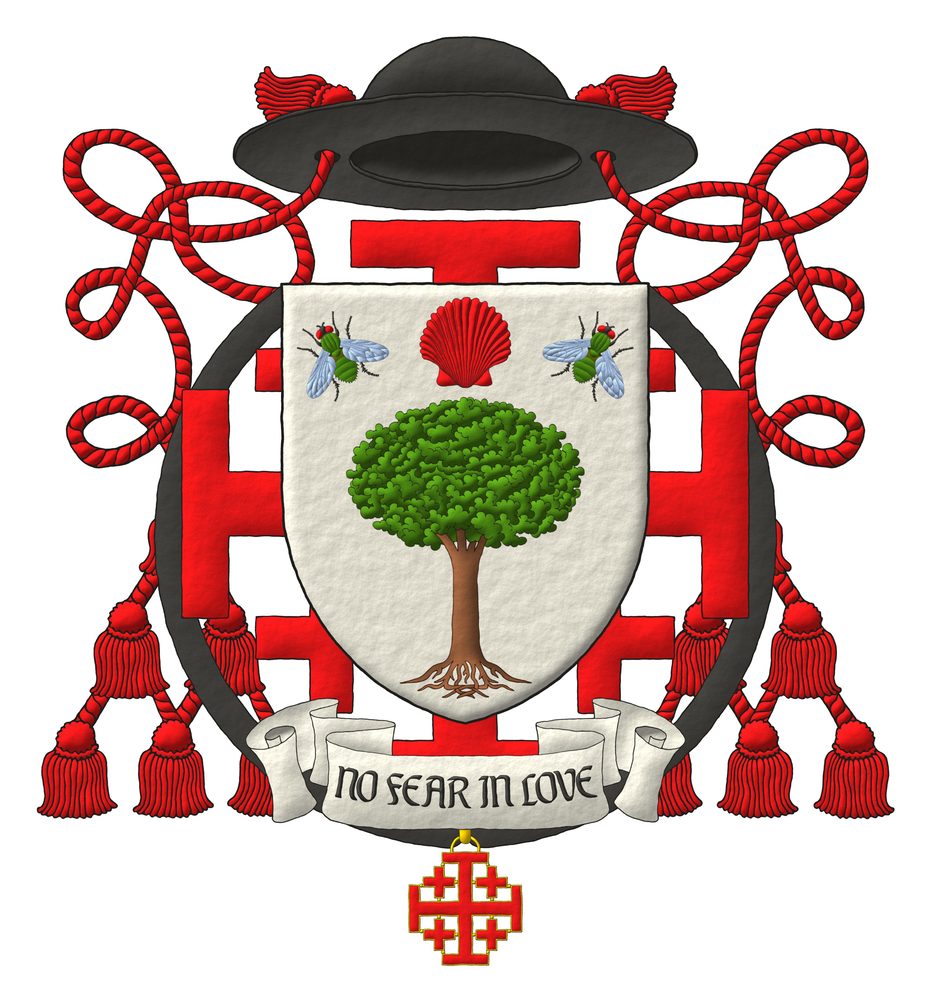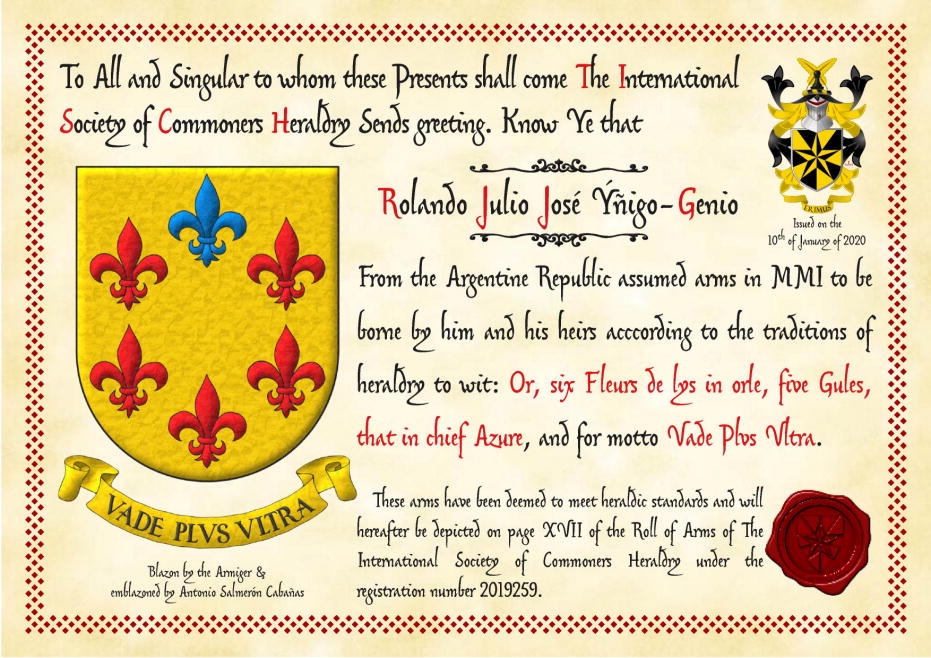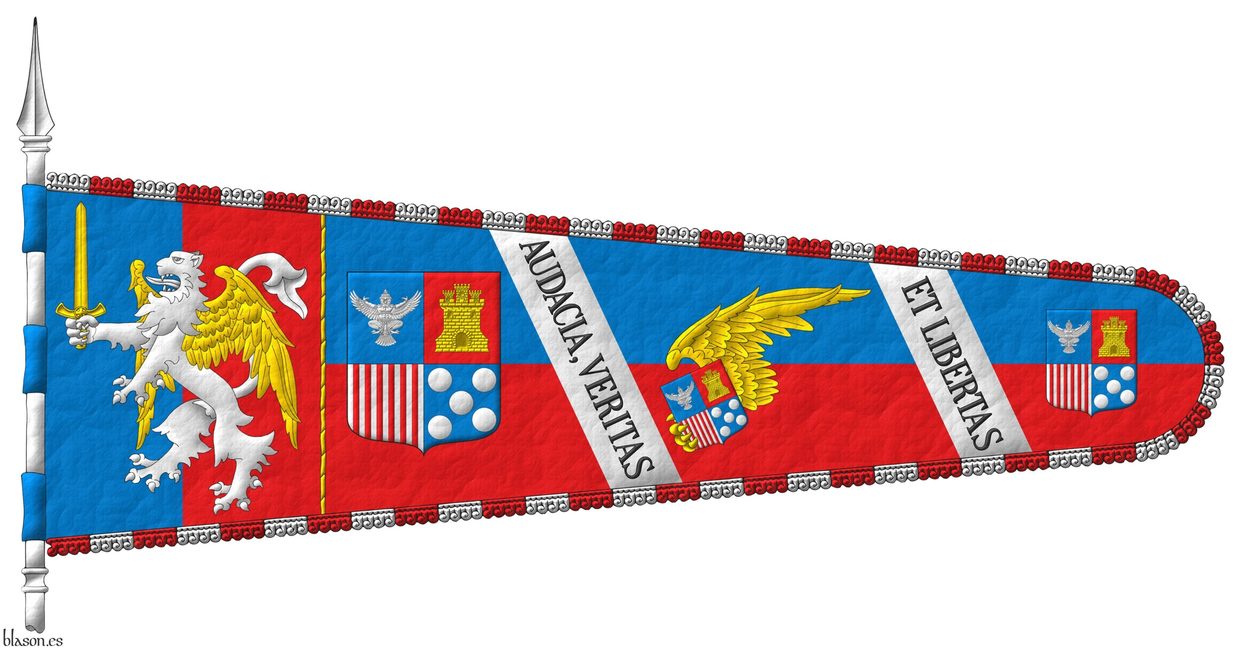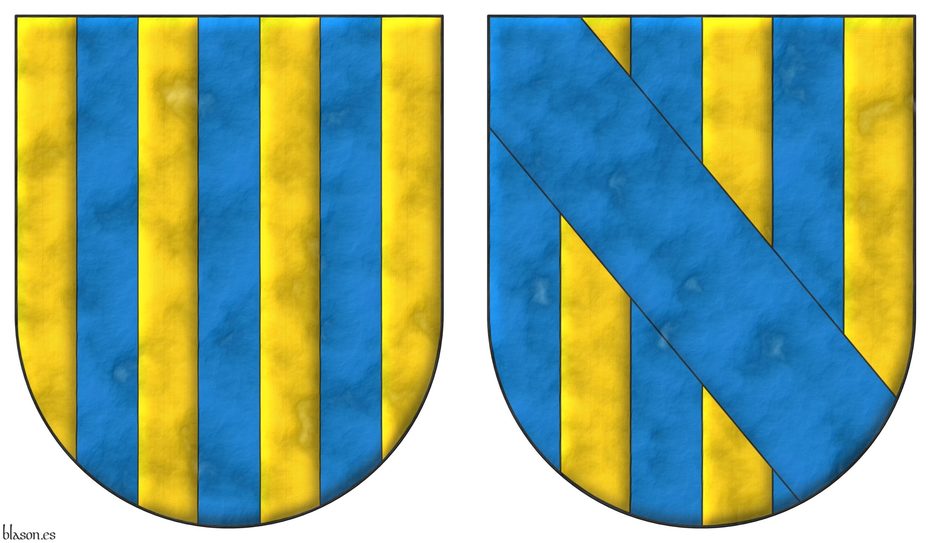Six

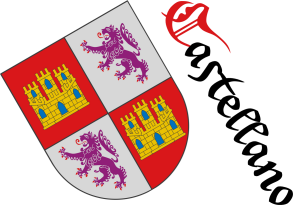
Adrian V
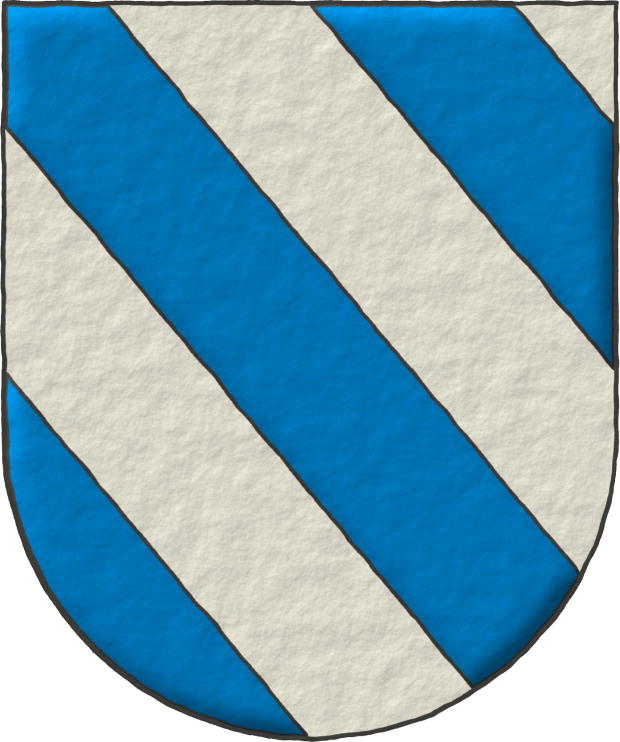
186th Pope of the Church, only 40 days in 1276. «Hadrianus V», born Ottobuono de Fieschi, was born in Genoa.
Bendy of six Azure and Argent.
Escudo bandado de seis piezas de azur y plata.
Papal coat of arms interpreted by me with: a shield with a rounded arch top; the field in plain tincture of Argent; the bands illuminated in Azure and outlined in Sable; and the whole in an elevated line style.
The blazon in French is «Bandé d'azur et d'argent de six pièces».
The banding is defined in [Avilés, J.; 1725a; page 40] and [Avilés, J.; 1780a; page 45] as the shields and also, the chiefs, fesses, pales, and figures, such as animals, etc., that are «covered and filled with bands in equal number, with as many of metal as of color».
Blazon keywords: Without divisions, Bendy, Six, Azure and Argent.
Style keywords: Semi-circular, Illuminated, Outlined in sable and Freehand.
Classification: Interpreted, Religious and Papal States.
Bearer: Adrian V.


Amitay Edward von Stiebel, plain tincture
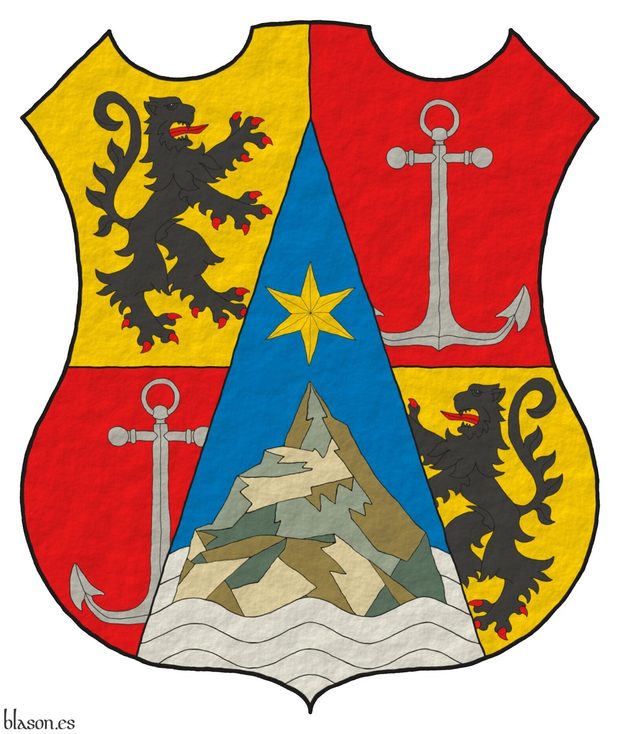
Quarterly: 1 Or, a lion rampant, facing sinister Sable, armed and langued Gules; 2 and 3 Gules, an anchor proper; 4 Or, a lion rampant Sable, armed and langued Gules; overall, a pile issuant from base Azure charged with a mount proper issuant from water issuant from base Argent, in chief, a mullet of six points Or.
Arms emblazoned by me, in flat tinctures, contoured in Sable, and with a texturized finishing.
Coat of arms of Amitay Edward von Stiebel emblazoned by me.
Blazon keywords: Or, Sable, Gules, Azure, Argent, One, Six, Quarterly, Lion, Rampant, Facing sinister, Armed, Langued, Anchor, Proper, Overall, Pile issuant from base, Charged, Mount, Issuant, Water, Issuant from base, In chief and Mullet.
Style keywords: Outlined in sable, Plain tincture and Bull's hide.
Classification: Personal, Interpreted, Boa and Coat of arms.
Bearer: Stiebel, Amitay Edward von.


Arms of Rex Lancefield with 2 Nordic scrolls
Paly of six Gules and Argent; overall, a fess Or charged with a lance Gules. Crest: Upon a helm with a wreath Argent and Gules, an arm vambraced, bendwise Argent, grasping, bend sinisterwise, a bow Gules, cord Or, and an arrow point sinister Argent. Mantling: Gules doubled Argent. Motto: «Inter Primos».
Coat of arms interpreted by me, highlighted with lights and shadows, contoured in Sable, with a chasuble external shape and with a freehand finishing.
Canting arms of Rex Lancefield emblazoned by me under the directions of his descendant Erik Paul Arnelien. My interpretation is based on a painting of this coat of arms, c. XIX, somewhat deteriorated by handling and the passage of time and also includes two Nordic scrolls, one on each side. I consider these two Nordic scrolls on either side of the coat of arms an external decoration as an artistic detail; therefore, they are not part of the blazon of the arms.
Blazon keywords: Gules, Argent, Or, Six, One, Paly, Overall, Fess, Charged, Spear, Crest, Upon (wreath), Helm, Lined, Wreath, Arm, Vambraced, Bendwise, Grasping, Bend sinisterwise, Bow, Cord, Arrow, Point sinister, Mantling and Motto.
Style keywords: Outlined in sable, Illuminated, Chasuble and Freehand.
Classification: Personal, Interpreted, Boa and Coat of arms.
Bearer: Lancefield, Rex.


Bosnia and Herzegovina
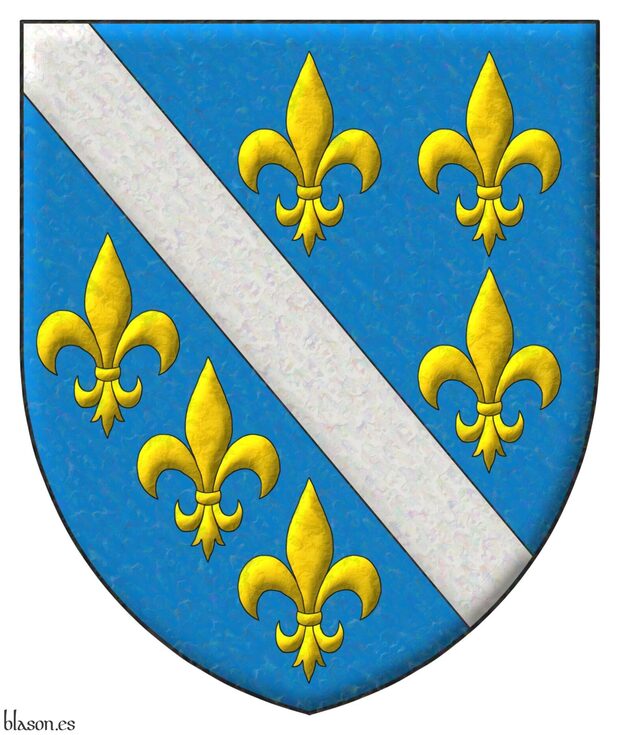
From 1992 to 1998
Azure, a bendlet Argent between six fleurs de lis Or.
Illuminated with lights and shadows and with a metallic and iridescent finish.
Coat of arms of Stephen Tvrtko I (circa 1338-1391) of the House of Kotromanic and 1st King of Bosnia and it was also the coat of arms of Bosnia and Herzegovina from 1992 to 1998.
The bendlet is a diminutive of the bend. It is a diminished bend, narrower, and typically reduced to 1/2 (as in this case) or to 1/3 of the width of a normal bend. This piece is called «cotiza» in Castilian, «cotice» in French, and «cotissa» in Italian. Remember that the width of the bend is usually 1/3 of the width of the coat of arms, therefore the width of the bendlet is between 1/3 * 1/2 = 1/6 and 1/3 * 1/3 = 1/9 of the width of the coat of arm.
Stephen Tvrtko I of Bosnia, from the House of Kotromanic, was a vassal of Louis I of Hungary. Louis I or Louis of Anjou, known as «the Great», from the Royal House of Anjou-Sicily, of the Capetian Dynasty, hence his coat of arms's 2nd quarter is seeded with fleur de lis, a feature also present in his father Charles I's arms, known as Charles Robert or Caroberto of Anjou. The Kotromanic family had in their coat of arms fleur de lis Or on a Azure field as a symbol of subordination to the Hungarian royal family.
Blazon keywords: Azure, One, Bendlet, Argent, Six, Fleur de lis and Or.
Style keywords: Metal beaten, Iridescent, Outlined in sable, Illuminated and Pointed.
Classification: Civic, Interpreted and Coat of arms.
Bearer: Bosnia and Herzegovina.


Boteler of Warrington
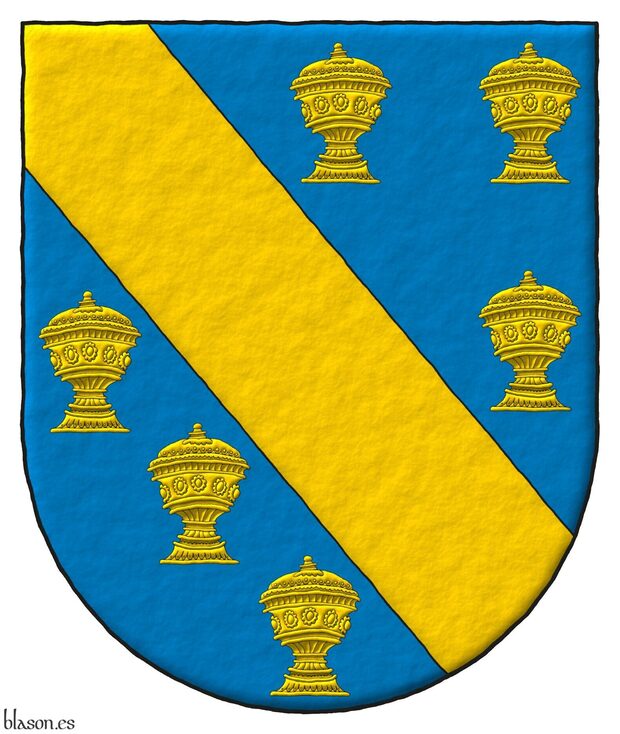
Azure, a bend between six covered cups Or.
Escudo de azur, una banda acompañada de seis copas todo de oro.
Illuminated with lights and shadows and with a freehand finish.
Around 1155, Beatrix de Villers married Richard le Boteler Pincerna, who became the 4th Baron of Warrington. The heir of Beatrix and Richard took the surname «le Boteler» and ruled the Warrington region, bearing arms Azure, a bend between six covered cups Or.
In Castilian, a «copa» has a lid and is referred to as a «covered cup» in English. When it doesn't have a lid, it's called a «cup» in English and a «cáliz» or «copón» in Castilian, the latter being a less preferred term for me. In English, the term «chalice» is also used, especially if it's adorned with gemstones, although that's more of an artistic license.
Naipes Heraclio Fournier is a renowned Spanish playing card manufacturer based in Villareal de Álava. The countless hours I have spent holding its cards in my hands are incalculable, whether playing with friends, opponents, or performing magic tricks. Its influence on my heraldic artwork is significant. For instance, in this covered cup.
The following image shows my covered cup and my two interpretations of his arms: 1) the most commonly viewed, and 2) my alternative layout.
Blazon keywords: Without divisions, Azure, One, Bend, Between, Six, Covered cup and Or.
Style keywords: Freehand, Outlined in sable, Illuminated and Semi-circular.
Classification: Interpreted and Kingdom of England.
Bearer: Boteler of Warrington.


Clement XII
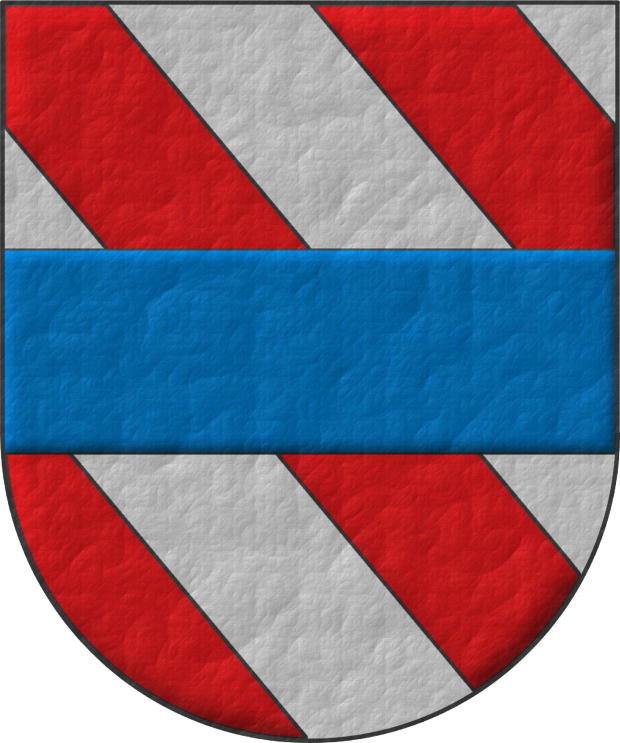
246th Pope of the Church, from 1730 to 1740. «Clemens XII», named Lorenzo Corsini, born in Florence and rests in St. John Lateran.
Bendy of six Gules and Argent; over all a fess Azure.
Escudo bandado de seis piezas de gules y plata; brochante sobre el todo una faja de azur.
Papal coat of arms interpreted with: a rounded mouth; the field in flat tincture of Argent; the fess and the bands outlined in Sable and illuminated in Gules and Azure; and the whole with a textured finish.
All are ordinaries, including the three bands and the fess, and since the blazon specifies that the fess is overall on the bands, therefore, it is not the Gules bands that are overall on the Azure fess, and they should be painted underneath.
Blazon keywords: Without divisions, Bendy, Six, Gules, Argent, Surmounted, Overall (deprecated), One, Fess and Azure.
Style keywords: Semi-circular, Illuminated, Outlined in sable and Freehand.
Classification: Interpreted, Religious and Papal States.
Bearer: Clement XII.


Coat of arms of Elias Yñigo-Genio
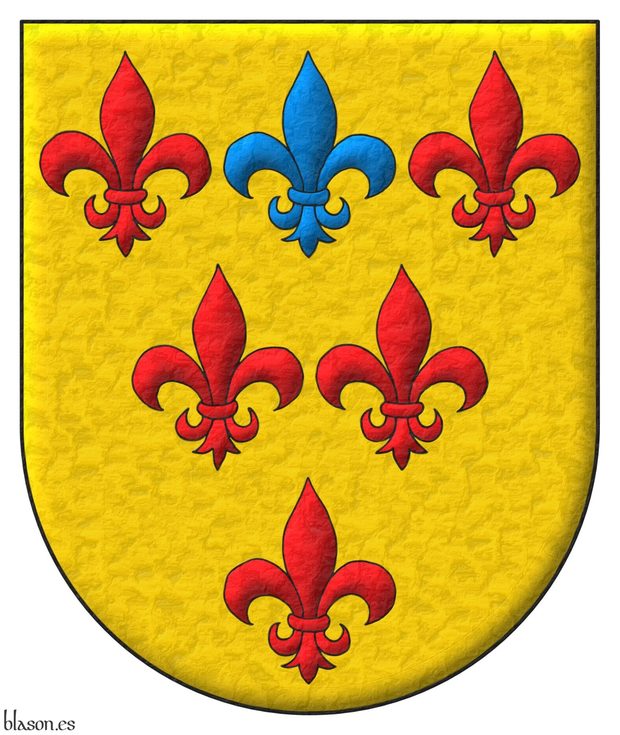
Or, six fleurs de lis, three, two, one, five Gules and one in the middle of the chief Azure.
Escudo de oro, seis flores de lis ordenadas, tres, dos y una, cinco de gules y una de azur en el centro del jefe.
Credits:
- Rolando Yñigo-Genio is the designer of the coat of arms.
- Antonio Salmerón y Cabañas is the author of the heraldic art.
Blazon keywords: Or, Six, Fleur de lis, Ordered, Three, two and one, Five, Gules, One, Azure and In the middle of the chief.
Style keywords: Semi-circular, Soft metal, Outlined in sable and Illuminated.
Classification: Interpreted, Personal and Coat of arms.
Bearer: Yñigo-Genio, Elias.


Coat of arms of Noelia Yñigo-Genio
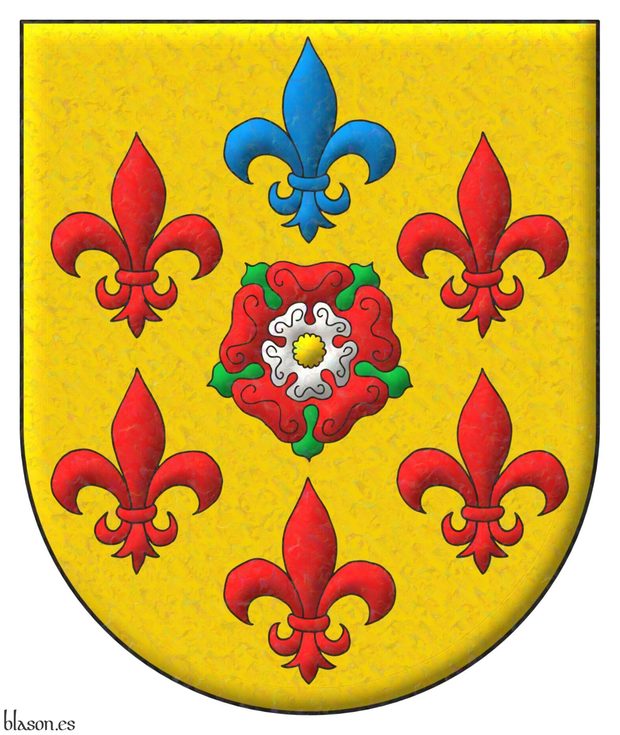
Or, a double rose Gules and Argent, barbed Vert, and seeded Or within six fleurs de lis in orle, five Gules and one in chief Azure.
Escudo de oro, una rosa doble de gules y plata, barbada de sinople y botonada de oro, rodeada de seis flores de lis en orla, cinco de gules y una de azur en jefe.
Credits:
- Rolando Yñigo-Genio is the designer of the coat of arms.
- Antonio Salmerón y Cabañas is the author of the heraldic art.
Blazon keywords: Or, Double rose, Gules, Argent, Barbed, Vert, Seeded, Six, Fleur de lis, Orle, Five, One, Azure and In chief.
Style keywords: Semi-circular, Iridescent, Outlined in sable and Illuminated.
Classification: Interpreted, Personal and Coat of arms.
Bearer: Yñigo-Genio, Noelia.


Commoners' certification designed by Randy David Lee Xavier House of Potts of Wentworth
Azure, a saltire Argent between two fleurs de lis in fess Or; on a chief Argent, a bald eagle displayed Azure, head and tail Argent, beaked, armed and membered Or, langued Gules; an inescutcheon Gules, six fleurs de lis, in chief one Argent between two Or, in fess two Argent, in base one Or.
The Commoners’ Certification of Arms for the House of Potts of Wentworth with its arms designed by Randy David Lee Xavier Potts and emblazoned by me.
Credits: Randy Potts is the designer of the coat of arms.
Blazon keywords: Azure, Argent, Or, Gules, One, Two, Six, Saltire, Between, In fess, Fleur de lis, Chief, Charged, Bald eagle, Eagle, Displayed, Head, Tail, Beaked, Armed, Membered, Langued, Inescutcheon, In pretence, In chief and In base.
Style keywords: Outlined in sable, Illuminated and Semi-circular.
Classification: Personal, Interpreted, Boa, Certification and Heraldic document.
Bearer: Potts of Wentworth, House of.


Commoners' certification for Corey Scott Lasco
Quarterly: 1 and 4 Azure, a saltire Argent between two fleurs de lis in fess Or; on a chief Argent, a bald eagle displayed Azure, head and tail Argent, beaked, armed and membered Or, langued Gules; 2 and 3 Gules, six fleurs de lis, in chief one Argent between two Or, in fess two Argent, in base one Or; within a bordure gyronny of twenty-four Argent and Azure; overall a crescent Argent.
The Commoners' Certification of Arms for Corey Scott Lasco with his arms designed by Randy David Lee Xavier Potts and emblazoned by me.
Credits: Randy Potts is the designer of the coat of arms.
Blazon keywords: Azure, Argent, Or, Gules, One, Two, Six, Twenty-four, Quarterly, Saltire, Between, In fess, Fleur de lis, Chief, Charged, Bald eagle, Eagle, Displayed, Head, Tail, Beaked, Armed, Membered, Langued, Bordure, Gyronny, Overall and Crescent.
Style keywords: Outlined in sable, Illuminated and Semi-circular.
Classification: Personal, Interpreted, Boa, Certification and Heraldic document.
Bearer: Lasco, Corey Scott.


Crest and mantling of Herbert Leo Buffenbarger
Barry of six, Argent and Azure, a pile throughout, counterchanged. Crest: Upon a helm with a wreath Argent and Azure, upon a trimount Gules, an eagle wings addorsed and inverted Azure, the head and tail Argent, nimbed and grasping a closed book Or. Mantling: Azure doubled Argent.
Arms emblazoned by me, highlighted with lights and shadows, contoured in Sable, and with a watercolor finishing.
These are the arms of Herbert Leo Buffenbarger, designed by his son John Alan Francis Buffenbarger, and emblazoned by me.
Blazon keywords: Argent, Azure, Gules, Or, One, Six, Three, Barry, Counterchanged, Pile, Throughout (chief base), Chaussé, Crest and mantling, Crest, Upon (wreath), Helm, Wreath, Upon, Trimount, Eagle, Wing, Addorsed, Head, Tail, Nimbed, Grasping, Closed book, Book and Mantling.
Style keywords: Outlined in sable, Illuminated and Watercolor.
Classification: Personal, Interpreted, Boa and Coat of arms.
Bearer: Buffenbarger, Herbert Leo.


Crest of Tiana Rose Lee Potts
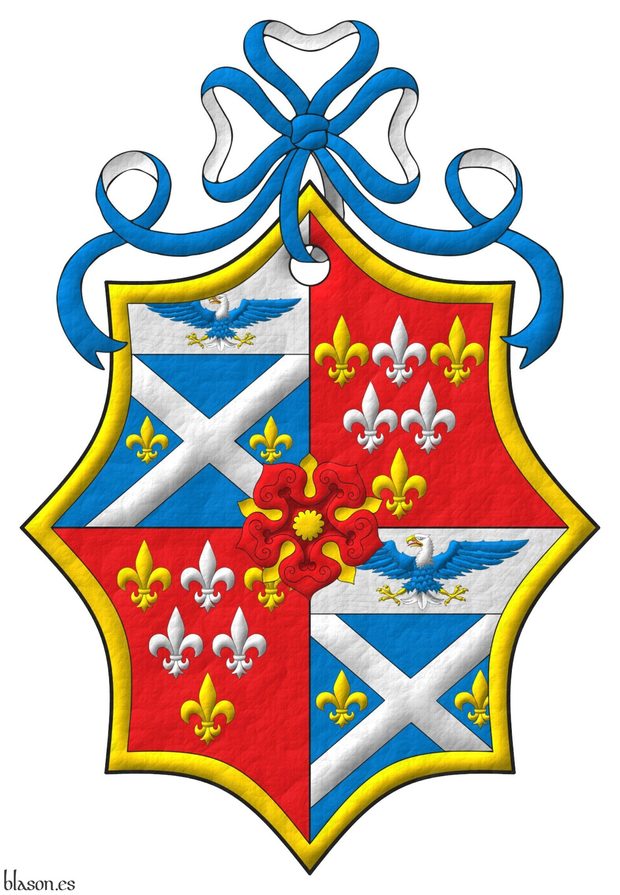
Quarterly: 1 and 4 Azure, a saltire Argent between two fleurs de lis in fess Or; on a chief Argent, a bald eagle displayed Azure, head and tail Argent, beaked, armed and membered Or, langued Gules; 2 and 3 Gules, six fleurs de lis, in chief one Argent between two Or, in fess two Argent, in base one Or; within a bordure Or; overall a rose Gules, leaved and seeded Or. Crest: A ribbon Azure doubled Argent.
Arms emblazoned by me, highlighted with lights and shadows, outlined in Sable, with an invected octagon outer contour and with a leather finish.
Credits: Randy Potts is the designer of the coat of arms.
Blazon keywords: Azure, Argent, Or, Gules, One, Two, Six, Quarterly, Saltire, Between, In fess, Fleur de lis, Chief, Charged, Bald eagle, Eagle, Displayed, Head, Tail, Beaked, Armed, Membered, Langued, Bordure, Overall, Rose, Leaved, Seeded, Ribbon and Doubled.
Style keywords: Outlined in sable, Illuminated, Invected octagon and Leather.
Classification: Personal, Interpreted, Boa and Coat of arms.
Bearer: Potts, Tiana Rose Lee.


Crown and motto of the Jean-Philippe Sendat
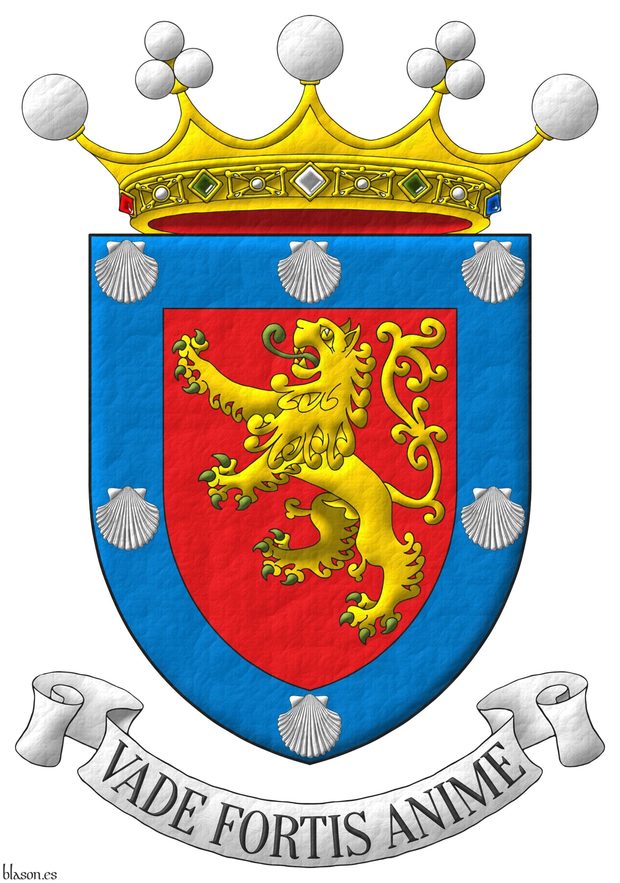
Gules, a lion rampant Or, langued and armed Vert; a bordure Azure charged with six escallops Argent. Crest: A crown. Moto: «Vade Fortis Anime».
Coat of arms emblazoned by me, illuminated with lights and shadows, outlined in Sable, with a pointed outer contour and with a leather finishing.
Blazon keywords: Gules, Or, Vert, Azure, Argent, One, Six, Lion, Rampant, Langued, Armed, Bordure, Charged, Escallop, Crown and Motto.
Style keywords: Outlined in sable, Illuminated, Pointed and Leather.
Classification: Personal, Interpreted, Boa and Coat of arms.
Bearer: Sendat, Jean-Philippe.


Durán Cabral de Melo e Alpoim, cadet branches of Fernando
![Durán Cabral de Melo e Alpoim, cadet branches of Fernando Quarterly: 1 Gules, a pale Or upon six waves Azure and Argent, a bordure Or charged with eight lions' heads erased Gules [for Durán]; 2 Azure, a crescent reversed Argent, in dexter chief a fleur de lis Or, a bordure Gules [for Alpoim]; 3 Argent, two goats in pale Purpure, horned Sable [for Cabral]; 4 Gules, a double cross throughout Or cantoned by six plates, a bordure Or [for Melo]; an inescutcheon Azure, five fleurs de lis Or.](../escudo_armas/DuranCabralMeloAlpoimF.22.Conopial.5Lises.TrazoAlzado.jpg)
Quarterly: 1 Gules, a pale Or upon six waves Azure and Argent, a bordure Or charged with eight lions' heads erased Gules [for Durán]; 2 Azure, a crescent reversed Argent, in dexter chief a fleur de lis Or, a bordure Gules [for Alpoim]; 3 Argent, two goats in pale Purpure, horned Sable [for Cabral]; 4 Gules, a double cross throughout Or cantoned by six plates, a bordure Or [for Melo]; an inescutcheon Azure, five fleurs de lis Or.
Escudo cuartelado: 1o de gules, un palo de oro sostenido de seis ondas de azur y plata, una bordura de oro cargada de ocho cabezas de león arrancadas de gules [de Durán]; 2o de azur, un creciente ranversado de plata, en la diestra del jefe una flor de lis de oro, una bordura de gules [de Alpoim]; 3o de plata, dos cabras en palo de púrpura, acornadas de sable [de Cabral]; 4o de gules, una cruz doble y plena de oro cantonada de seis bezantes de plata, una bordura de oro [de Melo]; un escusón de azur, cinco flores de lis de oro.
Coat of arms interpreted by me, illuminated with lights and shadows, outlined in Sable, and with a freehand finish.
Arms of the cadet branches of Fernando Durán Cabral de Melo e Alpoim, certified by Dr. Alfonso Ceballos-Escalera Gila, Chronicler of Arms of Castile and León, and emblazoned by me.
Blazon keywords: Gules, Or, Azure, Argent, One, Two, Five, Six, Seven, Eight, Quarterly, Pale, Upon, Wave, Bordure, Charged, Lion, Head, Erased, Crescent, Reversed, In the dexter chief, Fleur de lis, Goat, In pale, Horned, Double cross throughout, Cantoned, Plate and Inescutcheon.
Style keywords: Outlined in sable, Illuminated and Freehand.
Classification: Personal, Lineage, Interpreted, Boa and Coat of arms.
Bearer: Durán Cabral de Melo e Alpoim, cadet branches of Fernando.


Durán, lineage
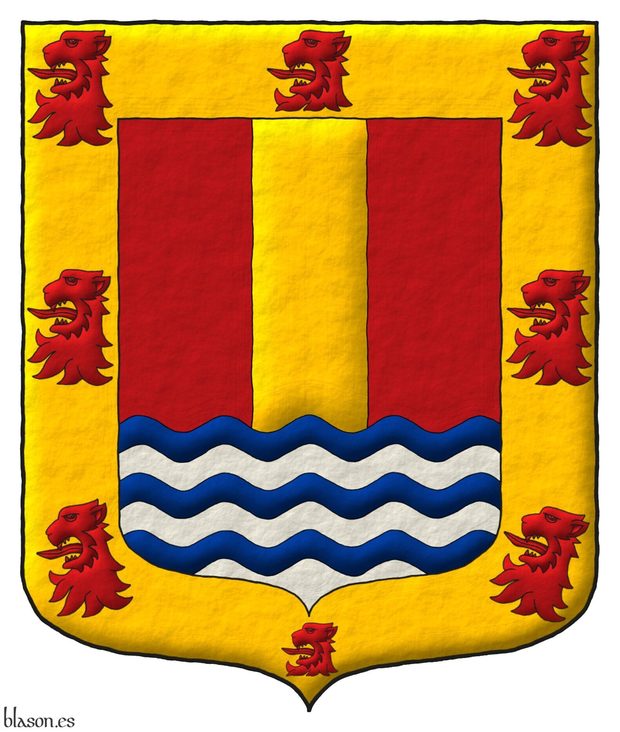
Gules, a pale Or upon six waves Azure and Argent, a bordure Or charged with eight lions' heads erased Gules.
Escudo de gules, un palo de oro sostenido de seis ondas de azur y plata, una bordura de oro cargada de ocho cabezas de león arrancadas de gules.
Coat of arms depicted by me, highlighted with lights and shadows, contoured in Sable, with an ogee external shape and with a freehand finish.
Coat of arms of the lineage Durán. This coat of arms has been created for Fernando Durán Cabral de Mello d’Alpoim as a preparatory work for his armorial bearings where the arms of Durán are in the 1st quarter.
Blazon keywords: Gules, Or, Azure, Argent, One, Six, Eight, Pale, Upon, Wave, Bordure, Charged, Lion, Head and Erased.
Style keywords: Outlined in sable, Illuminated, Ogee and Freehand.
Classification: Personal, Lineage, Interpreted, Boa and Coat of arms.
Bearer: Durán, lineage.


Farnese, Alessandro
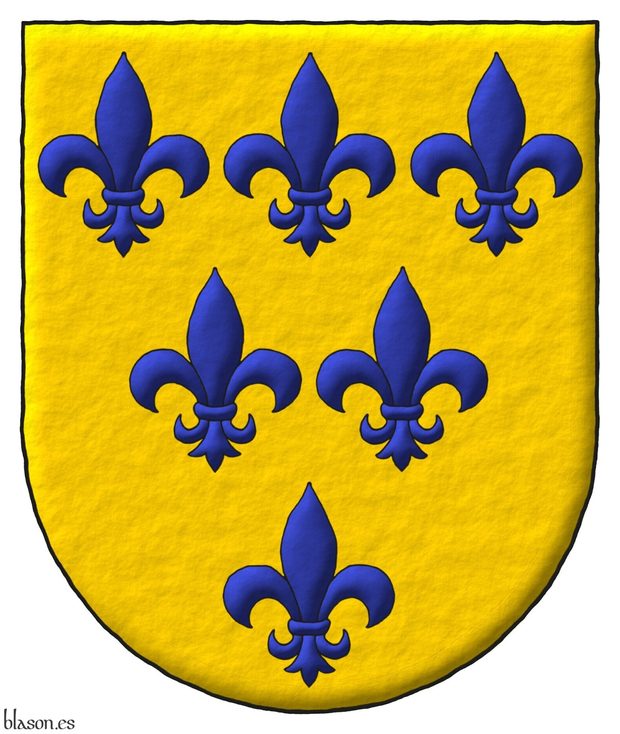
Or, six fleurs de lis Azure, 3, 2, and 1.
Escudo de oro, seis flores de lis de azur, 3, 2 y 1.
Coat of arms depicted by me, highlighted with lights and shadows, contoured in Sable, with a semi-circular outer contour and with a freehand finish.
Coat of arms of Alessandro Farnese, 1545–1592, emblazoned by me. In 1956, the fourth Tercio of the Spanish Legion was created and named Tercio Alessandro Farnese in his honor. The coat of arms of that Tercio features the arms of the Farnese in its central inescutcheon, although with its 6 fleurs de lis arranged in orle.
Blazon keywords: Or, Azure, Six and Fleur de lis.
Style keywords: Outlined in sable, Illuminated, Semi-circular and Freehand.
Classification: Personal, Interpreted, Boa and Coat of arms.
Bearer: Farnese, Alessandro.


Fernando Durán Cabral de Melo e Alpoim, St. Michael of the Wing and Maestranza of Castile
![Fernando Durán Cabral de Melo e Alpoim, St. Michael of the Wing and Maestranza of Castile Quarterly: 1 Gules, a pale Or upon six waves Azure and Argent, a bordure Or charged with eight lions' heads erased Gules [for Durán]; 2 Azure, a crescent reversed Argent, in dexter chief a fleur de lis Or, a bordure Gules [for Alpoim]; 3 Argent, two goats in pale Purpure, horned Sable [for Cabral]; 4 Gules, a double cross throughout Or cantoned by six plates, a bordure Or [for Melo]; an inescutcheon quarterly: 1 and 4 Argent, five escutcheons in cross Azure, each charged with five plates in saltire; a bordure Gules, charged with seven castles triple-towered Or, 3, 2, and 2 [for Portugal]; the whole debruised by a baston Sable; 2 and 3 party per chevron Argent and Gules, in chief two lions combatant Purpure, armed and langued Gules [for Leon], in base a castle triple-towered Or, port and windows Azure, masoned Sable [for Castile]; a bordure compony of eighteen sections Or and vair [for Álvarez de las Asturias]. Crest: Upon a helm in profile Argent, with visor bars Or, and a wreath Or and Azure, an arm proper, vested Azure, lined Or, supporting a scroll Azure doubled Or, inscribed with the cry «Notre Dame du Puy» Or. Mantling: Azure doubled Or. Suspended from the shield, the cross of the Royal Equestrian and Military Order of Saint Michael of the Wing and the insignia of the Equestrian Order of the Maestranza of Castile.](../escudo_armas/DuranCabralMeloAlpoimNoronhaF.26.SMiguelAla.MCastilla.TrazoAlzado.jpg)
Quarterly: 1 Gules, a pale Or upon six waves Azure and Argent, a bordure Or charged with eight lions' heads erased Gules [for Durán]; 2 Azure, a crescent reversed Argent, in dexter chief a fleur de lis Or, a bordure Gules [for Alpoim]; 3 Argent, two goats in pale Purpure, horned Sable [for Cabral]; 4 Gules, a double cross throughout Or cantoned by six plates, a bordure Or [for Melo]; an inescutcheon quarterly: 1 and 4 Argent, five escutcheons in cross Azure, each charged with five plates in saltire; a bordure Gules, charged with seven castles triple-towered Or, 3, 2, and 2 [for Portugal]; the whole debruised by a baston Sable; 2 and 3 party per chevron Argent and Gules, in chief two lions combatant Purpure, armed and langued Gules [for Leon], in base a castle triple-towered Or, port and windows Azure, masoned Sable [for Castile]; a bordure compony of eighteen sections Or and vair [for Álvarez de las Asturias]. Crest: Upon a helm in profile Argent, with visor bars Or, and a wreath Or and Azure, an arm proper, vested Azure, lined Or, supporting a scroll Azure doubled Or, inscribed with the cry «Notre Dame du Puy» Or. Mantling: Azure doubled Or. Suspended from the shield, the cross of the Royal Equestrian and Military Order of Saint Michael of the Wing and the insignia of the Equestrian Order of the Maestranza of Castile.
Arms emblazoned by me, highlighted with lights and shadows, contoured in Sable, with an ogee external shape and with a freehand finishing.
Blazon keywords: Gules, Or, Azure, Argent, One, Two, Five, Six, Seven, Eight, Eighteen, Quarterly, Pale, Upon, Wave, Bordure, Charged, Lion, Head, Erased, Crescent, Reversed, In the dexter chief, Fleur de lis, Goat, In pale, Horned, Double cross throughout, Cantoned, Plate, Inescutcheon, Escutcheon, In cross, In saltire, Castle, Triple-towered, Cadency, Baston, Party per chevron, In chief, Combatant, Armed, Langued, In base, Port and windows, Masoned, Compony, Vair, Upon (wreath), Helm, Facing dexter, Barred, Wreath, Arm, Proper, Vested, Lined, Grasping, Scroll, Doubled, Inscribed, War cry, Mantling, Suspended from the shield and Decoration.
Style keywords: Outlined in sable, Illuminated, Ogee and Freehand.
Classification: Personal, Lineage, Interpreted, Boa and Coat of arms.
Bearer: Durán Cabral de Melo e Alpoim, Fernando.


Fernando Marán Bié, schema 3x3
Party per fess: 1 Azure, an open book Argent, garnished Or, charged with a mullet Azure; 2 Gules, a tree eradicated between two apples Or; within a bordure embattled Or.
The coat of arms of Fernando Marán Bié designed by Ignacio Koblischek and emblazoned by me in 9 steps. While a mullet in English blazonry has five points by default and requires no further description, in Castilian heraldry the standard is six points, necessitating a specific mention whenever a five-pointed mullet is intended as in this case. The «filiera» is a diminished bordure, in English a «diminished bordure», but which is generally blazoned as «bordure».
Blazon keywords: Azure, Gules, Argent, Or, Six, One, Two, Party per fess, Open book, Book, Garnished, Charged, Mullet, Tree, Eradicated, Between, Apple, Bordure and Embattled.
Style keywords: Ratio, Outlined, Outlined in sable, Plain tincture, Illuminated and Semi-circular.
Classification: Personal, Interpreted, Schema, Boa and Coat of arms.
Bearer: Fernando Marán Bié.


Full achievement of Andrew Ronald McMillan Bell of Auchinreoch
Gules, a cross Argent charged with four ermine spots in cross Sable, in the dexter of the chief a lion’s head erased Or. Crest: Upon a helm befitting his degree issuant from a crown of Baron above the shield, with a chapeau Gules turned up ermine, a demi-lion, double queued Or, grasping in its dexter paw a pennon Gules, bearing a canton Azure, charged with a saltire Argent. Mantling: Gules doubled Argent. War cry above the crest: «ΑΛΑΛΑ ΑΛΑΛΑ». Motto: «Mieux vaut s’user que rouiller». Supporters: Two knights in three-quarter armour affronty proper, each holding with his outer hand a spear Argent bearing a banner, the dexter Sable, a panther rampant guardant Argent, incensed Or, collared, pendent therefrom a bell Azure, the sinister a banner barry of six Or and Azure, a canton Ermine, terraced Vert semé of Maltese Rock Centaury (Cheirolophus crassifolius) slipped proper.
Arms interpreted by me, illuminated with lights and shadows, contoured in Sable, with a pointed outer contour and with a freehand finish.
G0116, Chief Herald of Arms of Malta's grant for the arms of Andrew Ronald McMillan Bell of Auchinreoch, United Kingdom. These arms have been emblazoned by me for such grant. The English term «terraced», sometimes used in blazon, is equivalent to the term «compartment». In Castilian blazon we use the term «terrazado», in this case as an element outside the shield, while «terrazado» also exists inside the shield in base.
Blazon keywords: Gules, Argent, Sable, Or, Azure, Vert, One, Four, Six, Cross, Charged, Ermine, In cross, Dexter, Chief, Lion, Head, Erased, Crest, Upon (wreath), Helm, Issuant, Crown of Baron, Crown, Above the shield, Chapeau, Demi, Double queued, Grasping, Canton, Saltire, War cry, Above the crest, Motto, Supporter (human form), Supporter, Knight, Affronty, Proper, Spear, Panther, Rampant, Guardant, Enflamed, Collar, Suspended, Bell, Barry, Compartment, Semé and Slipped.
Style keywords: Outlined in sable, Illuminated, Pointed and Freehand.
Classification: Personal, Interpreted, Boa, Coat of arms, Pennon, Flag and Banner of arms.
Bearer: McMillan Bell of Auchinreoch, Andrew Ronald.


Full achievement of the Reverend John Muscat
Argent, a tree eradicated proper, in chief an escallop reversed Gules, between two flies pilewise proper. Crest: A galero Sable with two cords, one on each side, each with six tassels Gules. Motto: «No Fear In Love». Behind the shield, the cross of the Holy Sepulchre of Jerusalem. The shield is surrounded by the cross of a Knight Commander of the Holy Sepulchre of Jerusalem.
Arms interpreted by me, highlighted with lights and shadows, outlined in Sable, with a pointed outer contour and with a freehand finish.
G0117, Chief Herald of Arms of Malta's grant for the arms of the Reverend John Muscat, Honorary Monsignor of the Canon Chapter, Roman Catholic Cathedral of the Assumption, Gozo. These arms have been emblazoned by me for such grant.
Blazon keywords: Argent, Gules, One, Two, Six, Tree, Eradicated, Proper, In chief, Escallop, Between, Fly, Pilewise, Crest, Galero, Cord, Tassel, Motto, Behind the shield, Cross, Surrounded and Decoration.
Style keywords: Outlined in sable, Illuminated, Pointed and Freehand.
Classification: Religious, Interpreted, Boa and Coat of arms.
Bearer: Muscat, John.


Godfrey V, Count of Anjou
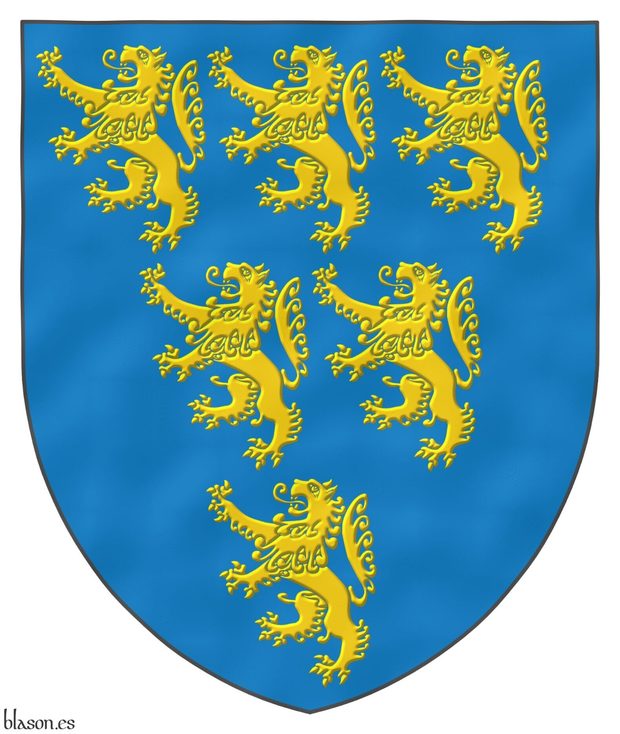
And Count of Touraine and Maine, Duke of Normandy, and founder of the Plantagenet dynasty.
Azure, six lions rampant Or, 3, 2 and 1.
Escudo de azur, seis leones rampantes de oro, 3, 2 y 1.
Existing armories interpreted by me as follows: the shield's shape is pointed; the field has been enameled in flat azure; the 6 lions are illuminated; and the entire composition has a watercolor finish.
When blazoning these 6 lions, considering that in heraldry the natural arrangement of elements is from more in chief to fewer in base, it would suffice to specify nothing more than «or and rampant». However, adding their arrangement «3, 2, and 1» can aid the reader, as done by [Avilés, J.; 1725b; page 124] and [Avilés, J.; 1780b; page 142] when blazoning the arms of Alfonso Enrique de Vick, writing «sable, and six bezants or, three, two, and one», meaning 6 ordered elements. In these sequences of number arrangements, I prefer to write Arabic numerals rather than words because, at times, the sequences can be long.
Blazon keywords: Without divisions, Azure, Six, Lion, Or, Rampant and Three, two and one.
Style keywords: Pointed, Illuminated, Outlined in the field tincture and Watercolor.
Classification: Interpreted, Personal, Coat of arms and House of Plantagenet.
Bearer: Godfrey V, Count of Anjou.


Gozo

Argent, upon a base barry wavy of six Argent and Sable, a trimount Sable.
Coat of arms emblazoned by me, highlighted with lights and shadows, contoured in Sable, and with a watercolor finish.
The coat of arms of Gozo, Republic of Malta, emblazoned by me.
Blazon keywords: Argent, Sable, One, Six, Upon, Base, Barry, Wavy and Trimount.
Style keywords: Outlined in sable, Illuminated, Bull's hide and Watercolor.
Classification: Civic, Interpreted, Boa and Coat of arms.
Bearer: Gozo.


Innocent IV
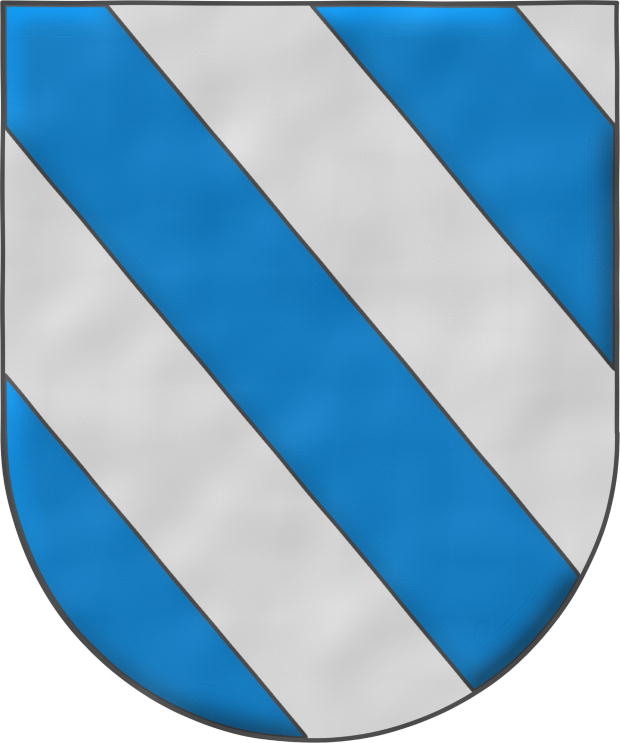
180th Pope of the Church, from 1243 to 1254. «Innocentius IV», born Sinibaldo dei Fieschi, was born in Manarola in northwest Italy.
Bendy of six Azure and Argent.
Escudo bandado de seis piezas de azur y plata.
Papal coat of arms interpreted by me with: a semicircular shield shape; a plain Argent field; bands illuminated in Azure and outlined in Sable; and the whole design with a watercolor finish.
Order of tinctures
In the bendy pattern, the tinctures are named starting from the one located at the dexter base of the shield and following an ascending sequence towards the sinister chief, although the most orthodox approach is to have only 2 tinctures, being one color and one metal.
Number of bands
It is said that it is not necessary to specify the number of bands when there are precisely 6, as in this case, and that it should be specified when there are, for example, 4 or 8. I have chosen to specify it for greater clarity of the blazon.
About the bendy pattern and the need to specify or not specify the number of its pieces, [Avilés, J.; 1725a; pages 40 and 41] and [Avilés, J.; 1780a; pages 45 and 46] say that it is «composed of four, six, or eight bends; in such a way that there are as many colors as metals, always specifying the number four and eight bands when blazoning, and not the one composed of six, as it is understood thus, without declaring the number of pieces» and without agreeing with it, and by its wording I believe that he is not entirely in agreement either, he adds «the reason that may exist for not specifying the number of six bends (although the authors do not express it) is that as the bend is one-third of the shield; and having six pieces, or six bends, the resulting number is doubled, as if the three parts were divided, which implies that the shield is filled with three bends; and taking the denomination of the figure infers, that the bendy is of six pieces: which does not happen with this equality in those of four and eight, requiring other proportions and consequently it becomes necessary to specify their number», therefore, note that the bendy of 6 does not follow the proportions of the bend, nor do those of 4 or 8, the only differential property of the one of 6 is being a multiple of 3, being 1/3 the width of the bend.
Blazon keywords: Without divisions, Bendy, Six, Azure and Argent.
Style keywords: Semi-circular, Illuminated, Outlined in sable and Watercolor.
Classification: Interpreted, Religious and Papal States.
Bearer: Innocent IV.


ISCH Certification for Rolando Yñigo-Genio
The Commoners' Certification of Arms for Rolando Ýñigo-Genio, arms designed by him and emblazoned by me.
Or, six fleurs de lis in orle, five Gules and one in chief Azure. Motto: «Vade Plvs Vltra».
Credits: Rolando Yñigo-Genio is the designer of the coat of arms and Antonio Salmerón y Cabañas is the author of the heraldic art.
Blazon keywords: Or, Six, Fleur de lis, Orle, Five, Gules, One, Azure, In chief and Motto.
Classification: Interpreted, Personal, Certification and Heraldic document.
Bearer: Yñigo-Genio, Rolando.


Jones, Easton Michael
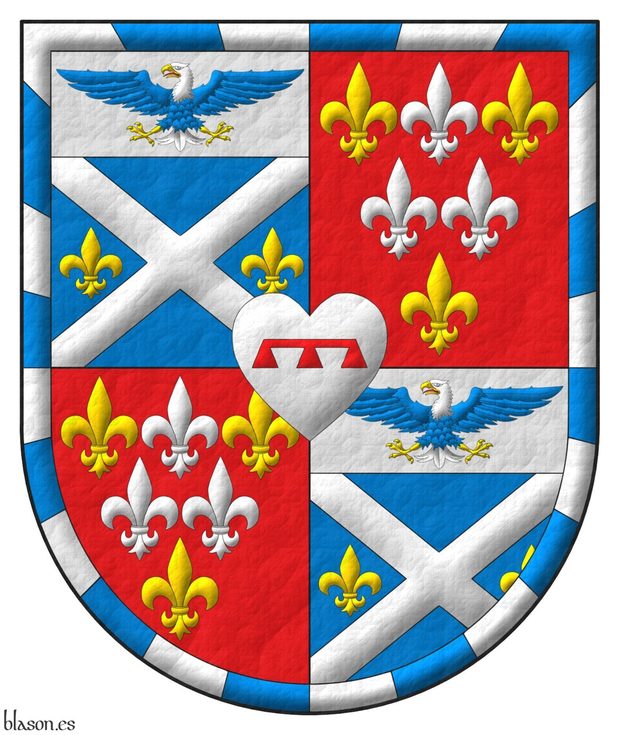
Quarterly: 1 and 4 Azure, a saltire Argent between two fleurs de lis in fess Or; on a chief Argent, a bald eagle displayed Azure, head and tail Argent, beaked, armed and membered Or, langued Gules; 2 and 3 Gules, six fleurs de lis, in chief one Argent between two Or, in fess two Argent, in base one Or; within a bordure gyronny of twenty-four Argent and Azure; overall a heart Argent charged with a label Gules.
Escudo cuartelado: 1o y 4o de azur, un sotuer de plata acompañado en faja de dos flores de lis de oro; en un jefe de plata, un águila calva de azur, cabeza y cola de plata, picada, armada y membrada de oro, lampasada de gules; 2o y 3o de gules, seis flores de lis, en jefe una de plata entre dos de oro, en faja dos de plata y en punta una de oro; una bordura jironada de veinticuatro piezas de plata y azur; brochante sobre el todo un corazón de plata cargado de un lambel de gules.
Arms painted by me, highlighted with lights and shadows, contoured in Sable, with a semi-circular outer contour and with a leather finishing.
The coat of arms of Easton Michael Jones designed by Randy David Lee Xavier Potts and emblazoned by me.
Credits: Randy Potts is the designer of the coat of arms.
Blazon keywords: Azure, Argent, Or, Gules, One, Two, Six, Twenty-four, Quarterly, Saltire, Between, In fess, Fleur de lis, Chief, Charged, Bald eagle, Eagle, Displayed, Head, Tail, Beaked, Armed, Membered, Langued, Bordure, Gyronny, Overall, Heart and Label.
Style keywords: Outlined in sable, Illuminated, Semi-circular and Leather.
Classification: Personal, Interpreted, Boa and Coat of arms.
Bearer: Jones, Easton Michael.


Jones, Rhettlee Cooper
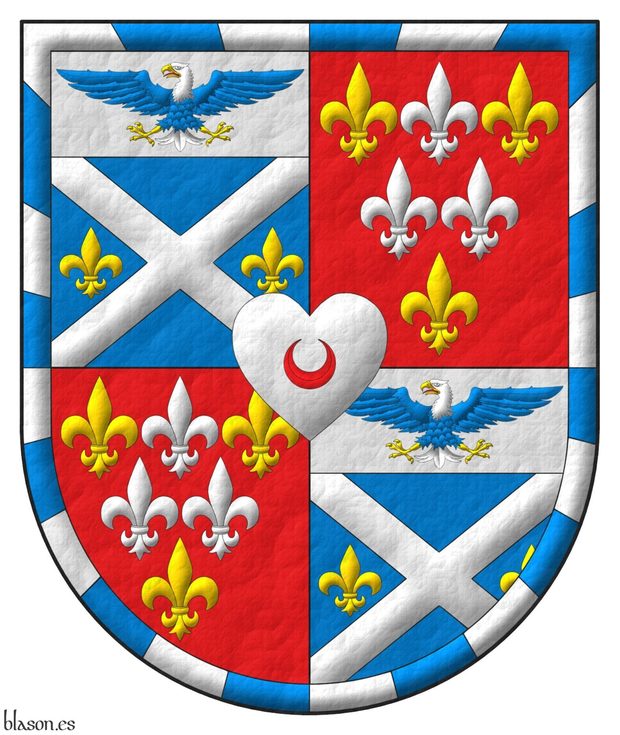
Quarterly: 1 and 4 Azure, a saltire Argent between two fleurs de lis in fess Or; on a chief Argent, a bald eagle displayed Azure, head and tail Argent, beaked, armed and membered Or, langued Gules; 2 and 3 Gules, six fleurs de lis, in chief one Argent between two Or, in fess two Argent, in base one Or; within a bordure gyronny of twenty-four Argent and Azure; overall a heart Argent charged with a crescent Gules.
Escudo cuartelado: 1o y 4o de azur, un sotuer de plata acompañado en faja de dos flores de lis de oro; en un jefe de plata, un águila calva de azur, cabeza y cola de plata, picada, armada y membrada de oro, lampasada de gules; 2o y 3o de gules, seis flores de lis, en jefe una de plata entre dos de oro, en faja dos de plata y en punta una de oro; una bordura jironada de veinticuatro piezas de plata y azur; brochante sobre el todo un corazón de plata cargado de un creciente de gules.
Coat of arms interpreted by me, highlighted with lights and shadows, contoured in Sable, with a semi-circular outer contour and with a leather finishing.
The coat of arms of Rhettlee Cooper Jones designed by Randy David Lee Xavier Potts and emblazoned by me.
Credits: Randy Potts is the designer of the coat of arms.
Blazon keywords: Azure, Argent, Or, Gules, One, Two, Six, Twenty-four, Quarterly, Saltire, Between, In fess, Fleur de lis, Chief, Charged, Bald eagle, Eagle, Displayed, Head, Tail, Beaked, Armed, Membered, Langued, Bordure, Gyronny, Overall, Heart and Crescent.
Style keywords: Outlined in sable, Illuminated, Semi-circular and Leather.
Classification: Personal, Interpreted, Boa and Coat of arms.
Bearer: Jones, Rhettlee Cooper.


Lasco, Hudson Hayes
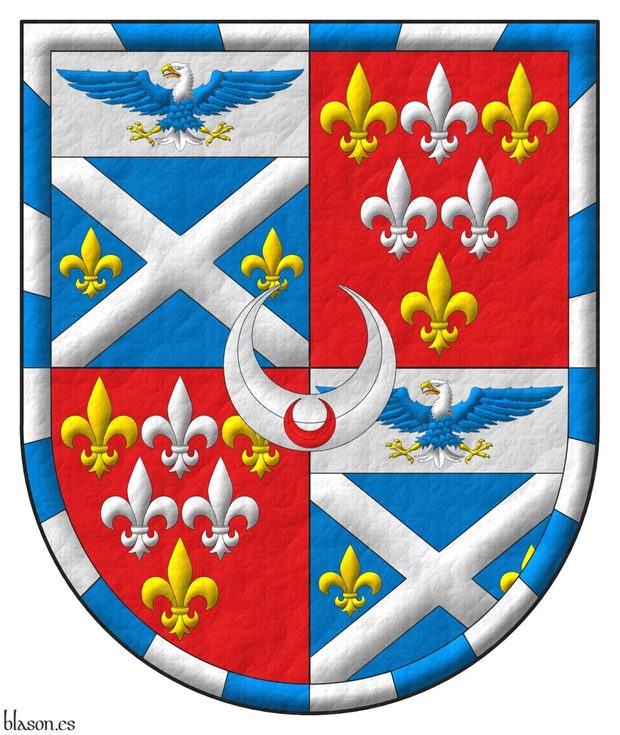
Quarterly: 1 and 4 Azure, a saltire Argent between two fleurs de lis in fess Or; on a chief Argent, a bald eagle displayed Azure, head and tail Argent, beaked, armed and membered Or, langued Gules; 2 and 3 Gules, six fleurs de lis, in chief one Argent between two Or, in fess two Argent, in base one Or; within a bordure gyronny of twenty-four Argent and Azure; overall a crescent Argent charged with a crescent Gules.
Escudo cuartelado: 1o y 4o de azur, un sotuer de plata acompañado en faja de dos flores de lis de oro; en un jefe de plata, un águila calva de azur, cabeza y cola de plata, picada, armada y membrada de oro, lampasada de gules; 2o y 3o de gules, seis flores de lis, en jefe una de plata entre dos de oro, en faja dos de plata y en punta una de oro; una bordura jironada de veinticuatro piezas de plata y azur; brochante sobre el todo un creciente de plata cargado de un creciente de gules.
Coat of arms interpreted by me, illuminated with lights and shadows, outlined in Sable, with a semi-circular outer contour and with a leather finishing.
The coat of arms of Hudson Hayes Lasco designed by Randy David Lee Xavier Potts and emblazoned by me.
Credits: Randy Potts is the designer of the coat of arms.
Blazon keywords: Azure, Argent, Or, Gules, One, Two, Six, Twenty-four, Quarterly, Saltire, Between, In fess, Fleur de lis, Chief, Charged, Bald eagle, Eagle, Displayed, Head, Tail, Beaked, Armed, Membered, Langued, Bordure, Gyronny, Overall and Crescent.
Style keywords: Outlined in sable, Illuminated, Semi-circular and Leather.
Classification: Personal, Interpreted, Boa and Coat of arms.
Bearer: Lasco, Hudson Hayes.


Lasco, Ryker Scott
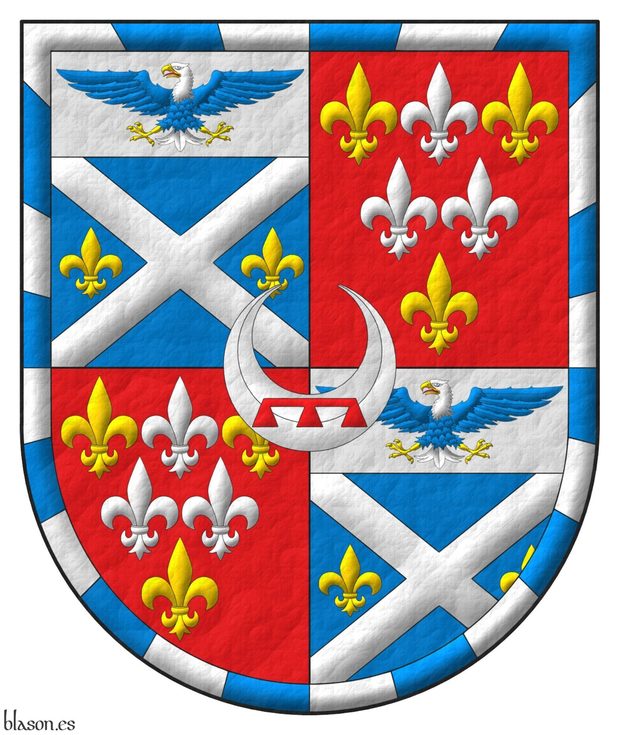
Quarterly: 1 and 4 Azure, a saltire Argent between two fleurs de lis in fess Or; on a chief Argent, a bald eagle displayed Azure, head and tail Argent, beaked, armed and membered Or, langued Gules; 2 and 3 Gules, six fleurs de lis, in chief one Argent between two Or, in fess two Argent, in base one Or; within a bordure gyronny of twenty-four Argent and Azure; overall a crescent Argent charged with a label Gules.
Escudo cuartelado: 1o y 4o de azur, un sotuer de plata acompañado en faja de dos flores de lis de oro; en un jefe de plata, un águila calva de azur, cabeza y cola de plata, picada, armada y membrada de oro, lampasada de gules; 2o y 3o de gules, seis flores de lis, en jefe una de plata entre dos de oro, en faja dos de plata y en punta una de oro; una bordura jironada de veinticuatro piezas de plata y azur; brochante sobre el todo un creciente de plata cargado de un lambel de gules.
Arms depicted by me, highlighted with lights and shadows, contoured in Sable, with a semi-circular outer contour and with a leather finish.
The coat of arms of Ryker Scott Lasco designed by Randy David Lee Xavier Potts and emblazoned by me.
Credits: Randy Potts is the designer of the coat of arms.
Blazon keywords: Azure, Argent, Or, Gules, One, Two, Six, Twenty-four, Quarterly, Saltire, Between, In fess, Fleur de lis, Chief, Charged, Bald eagle, Eagle, Displayed, Head, Tail, Beaked, Armed, Membered, Langued, Bordure, Gyronny, Overall, Crescent and Label.
Style keywords: Outlined in sable, Illuminated, Semi-circular and Leather.
Classification: Personal, Interpreted, Boa and Coat of arms.
Bearer: Lasco, Ryker Scott.


Lorena Correa
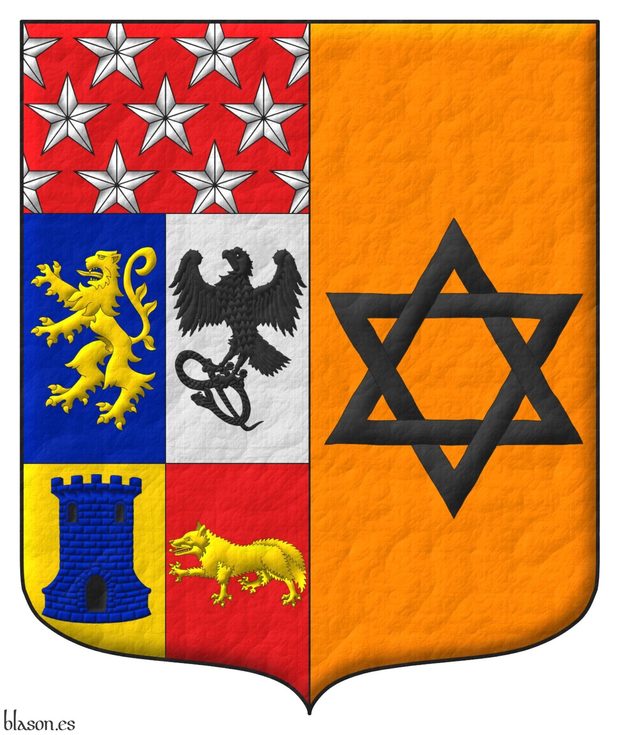
Party per pale: 1 quarterly: 1 Azure, a lion rampant Or, 2 Argent, a falcon rising, grasping in its paws a serpent Sable, 3 Or, a tower Azure, port, windows, and masoned Sable, 4 Gules, a fox passant Or, a chief Gules semé of mullets Argent; 2 Orange, a mullet of six points voided, interlaced Sable.
Coat of arms emblazoned by me with a shape ended with an ogee arch, illuminated, and its finishing is that seems leather.
The text «a mullet of six points voided, interlaced» could be written as «a star of David».
Blazon keywords: Party per pale, Quarterly, Azure, One, Lion, Rampant, Or, Argent, Falcon, Rising, Grasping, Claw, Serpent, Sable, Tower, Port and windows, Masoned, Gules, Fox, Passant, Chief, Semé, Mullet, Five, Base (lower 1/3), Orange, Six, Voided and Interlaced.
Style keywords: Ogee, Outlined in sable, Illuminated and Leather.
Classification: Personal, Interpreted and Coat of arms.
Bearer: Correa, Lorena.


Malka Gittel Bas Reuven, page of armorial
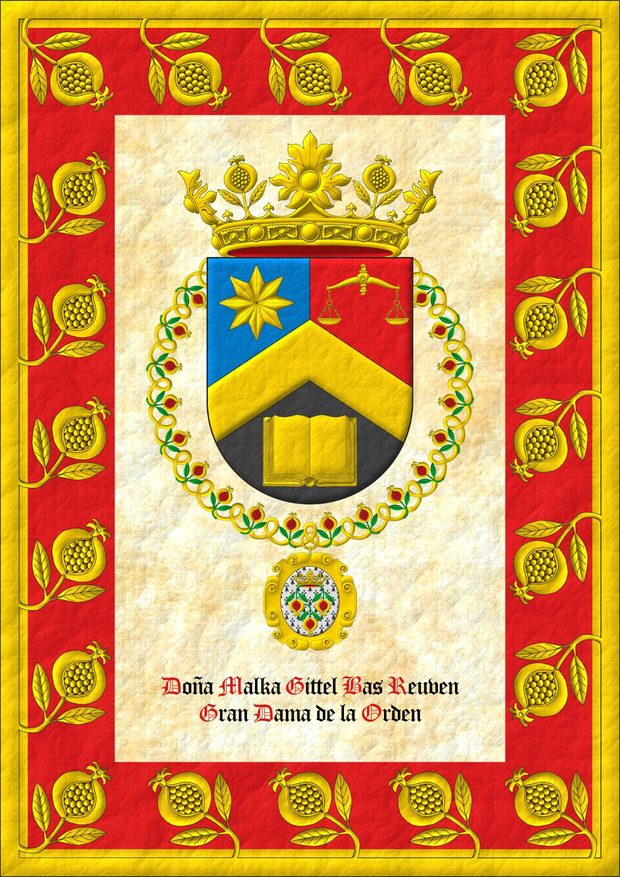
Tierced pallwise inverted Azure, Gules, and Sable; overall a chevron between, in the dexter of the chief, a mullet of six points, in the sinister of the chief a pair of scales, and in base an open book Or.
It has been painted by me, illuminated with lights and shadows, contoured in Sable, with a semi-circular outer contour and with a texturized finish.
Coat of arms of Her Excellency Ratu Muda Malka Bas Reuven emblazoned by me with for the Roll of Arms of the Soberana y Muy Noble Orden de la Granada.
Blazon keywords: Azure, Gules, Sable, Or, One, Six, Tierced pallwise inverted, Overall, Chevron, Between, Dexter, Chief, Mullet, Sinister, Pair of scales, In base, Open book, Book, Crown of the Sovereign and Most Noble Order of the Pomegranate, Crown, Surrounded and Collar.
Style keywords: Outlined in sable, Illuminated and Semi-circular.
Classification: Personal, Interpreted, Boa, Armorial roll and Castilian language.
Bearer: Gittel Bas Reuven, Malka.


Melo, lineage
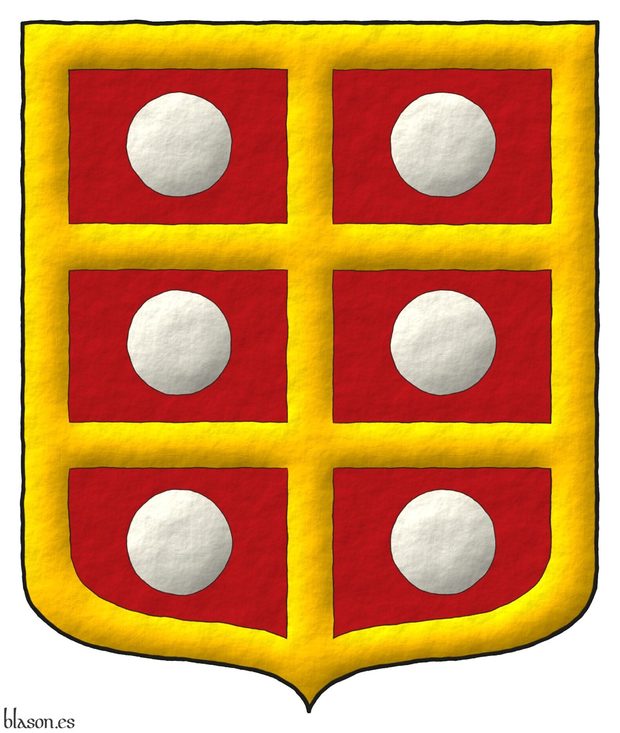
Gules, a double cross throughout Or cantoned by six plates, a bordure Or.
Escudo de gules, una cruz doble y plena de oro cantonada de seis bezantes de plata, una bordura de oro.
Coat of arms emblazoned by me, highlighted with lights and shadows, contoured in Sable, with an ogee outer contour and with a freehand finish.
Coat of arms of the lineage Melo. This coat of arms has been created for Fernando Durán Cabral de Mello d’Alpoim as a preparatory work for his armorial bearings where the arms of Melo are in the 4th quarter.
Blazon keywords: Gules, Or, Argent, One, Six, Double cross throughout, Cantoned, Plate and Bordure.
Style keywords: Outlined in sable, Illuminated, Ogee and Freehand.
Classification: Personal, Lineage, Interpreted, Boa and Coat of arms.
Bearer: Melo, lineage.


Pius V
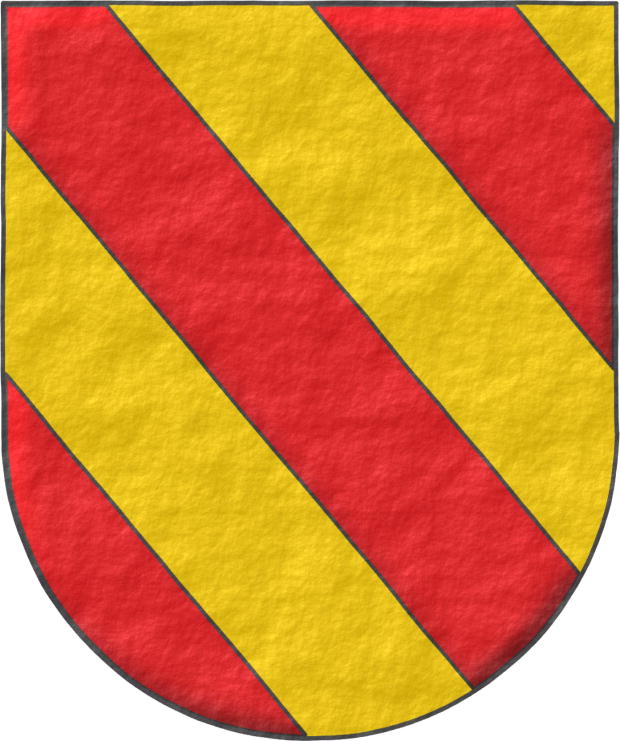
225th Pope of the Church, from 1566 to 1572. «Pius V», named Antonio Michele Ghislieri, was canonized in 1712.
Bendy of six Gules and Or.
Escudo bandado de seis piezas de gules y oro.
Papal coat of arms interpreted with: a rounded mouth; the field in flat tincture of Or; the bands outlined in Sable and illuminated in Gules; and the whole with a rough finish.
I have also seen this coat of arms described as «a shield banded of six pieces of Or and Gules».
Blazon keywords: Without divisions, Bendy, Six, Gules and Or.
Style keywords: Semi-circular, Illuminated, Outlined in sable and Rough.
Classification: Interpreted, Religious and Papal States.
Bearer: Pius V.


Potts, Kimberley Ann
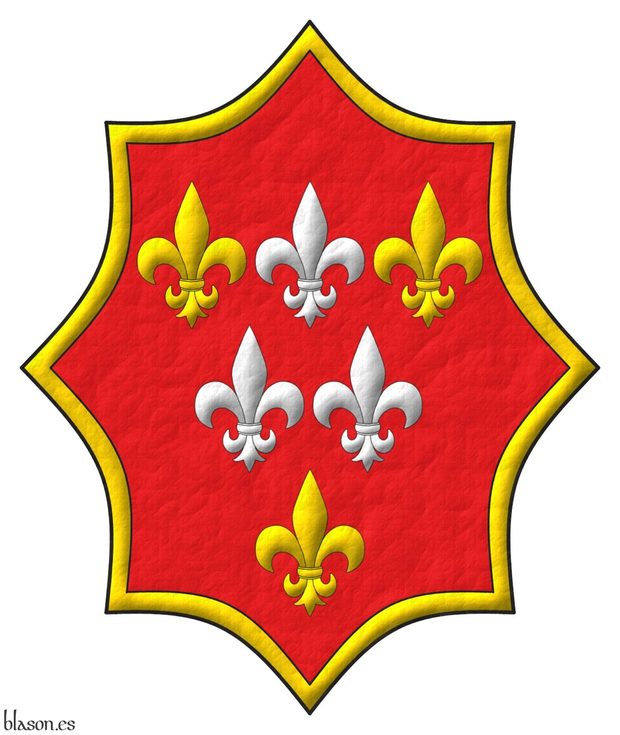
Gules, six fleurs de lis, in chief one Argent between two Or, in fess two Argent, in base one Or; within a bordure Or.
Escudo de gules, seis flores de lis, en jefe una de plata entre dos de oro, en faja dos de plata, en punta una de oro; una bordura de oro.
Arms interpreted by me, illuminated with lights and shadows, contoured in Sable, with an invected octagon outer contour and with a leather finishing.
The coat of arms of Kimberley Ann Potts of Stountenburg, a heraldic heiress, emblazoned by me.
Blazon keywords: Gules, Argent, Or, Six, One, Fleur de lis, In chief, Between, In fess, In base and Bordure.
Style keywords: Outlined in sable, Illuminated, Invected octagon and Leather.
Classification: Personal, Interpreted, Boa and Coat of arms.
Bearer: Potts, Kimberley Ann.


Richard de Bures tricking
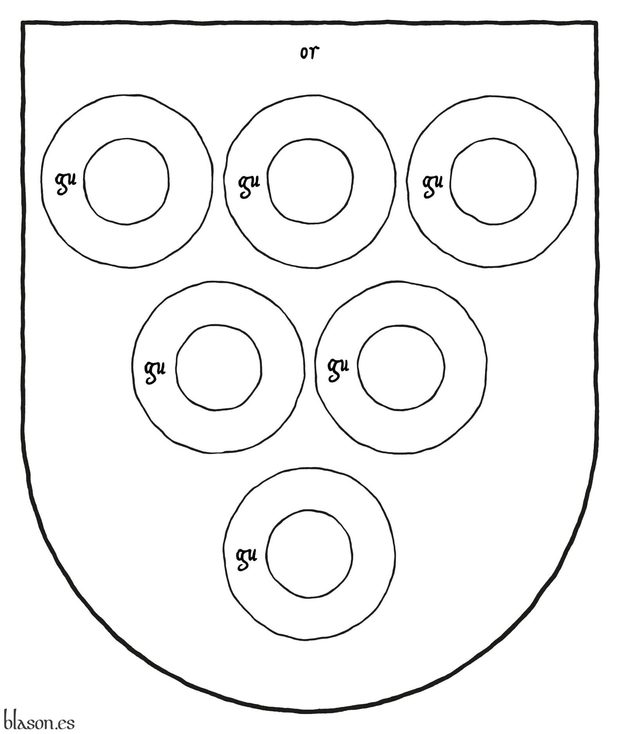
Or, six annulets Gules, 3, 2, and 1.
Escudo de oro, seis anilletes de gules, ordenados 3, 2 y 1.
Blazon keywords: Or, Six, Annulet, Gules, Ordered, Three, Two and One.
Style keywords: Outlined in sable, Semi-circular and Tricking.
Classification: Religious, Military, Knights Templar, Interpreted and Coat of arms.
Bearer: Richard, Richard.


Robidoux, Makayla Danée
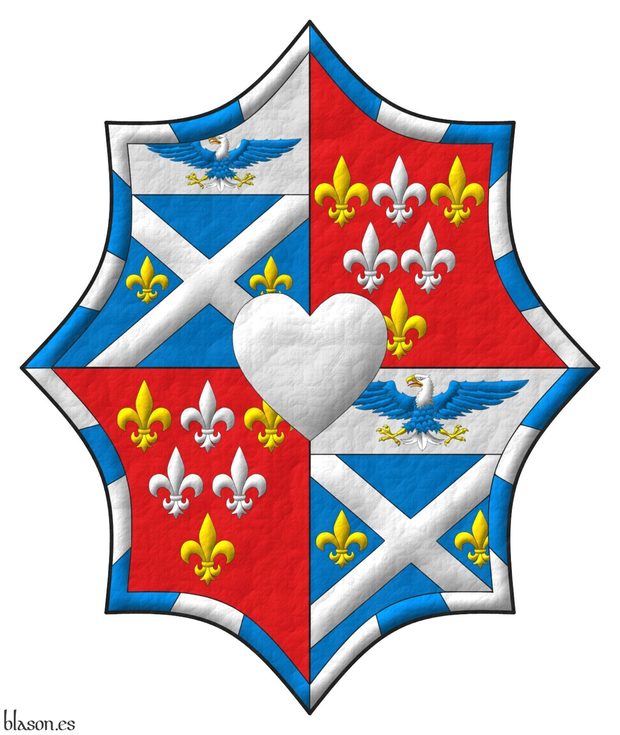
Quarterly: 1 and 4 Azure, a saltire Argent between two fleurs de lis in fess Or; on a chief Argent, a bald eagle displayed Azure, head and tail Argent, beaked, armed and membered Or, langued Gules; 2 and 3 Gules, six fleurs de lis, in chief one Argent between two Or, in fess two Argent, in base one Or ; within a bordure gyronny of twenty-four Argent and Azure; overall a heart Argent.
Escudo cuartelado: 1o y 4o de azur, un sotuer de plata acompañado en faja de dos flores de lis de oro; en un jefe de plata, un águila calva de azur, cabeza y cola de plata, picada, armada y membrada de oro, lampasada de gules; 2o y 3o de gules, seis flores de lis, en jefe una de plata entre dos de oro, en faja dos de plata y en punta una de oro ; una bordura jironada de veinticuatro piezas de plata y azur; brochante sobre el todo un corazón de plata.
Coat of arms emblazoned by me, highlighted with lights and shadows, outlined in Sable, with an invected octagon outer contour and with a leather finish.
The coat of arms of Makayla Danée Robidoux designed by Randy David Lee Xavier Potts and emblazoned by me.
Credits: Randy Potts is the designer of the coat of arms.
Blazon keywords: Azure, Argent, Or, Gules, One, Two, Six, Twenty-four, Quarterly, Saltire, Between, In fess, Fleur de lis, Chief, Charged, Bald eagle, Eagle, Displayed, Head, Tail, Beaked, Armed, Membered, Langued, Bordure, Gyronny, Overall and Heart.
Style keywords: Outlined in sable, Illuminated, Invected octagon and Leather.
Classification: Personal, Interpreted, Boa and Coat of arms.
Bearer: Robidoux, Makayla Danée.


Rodelo lineage from Galicia, color Gules and metal Or
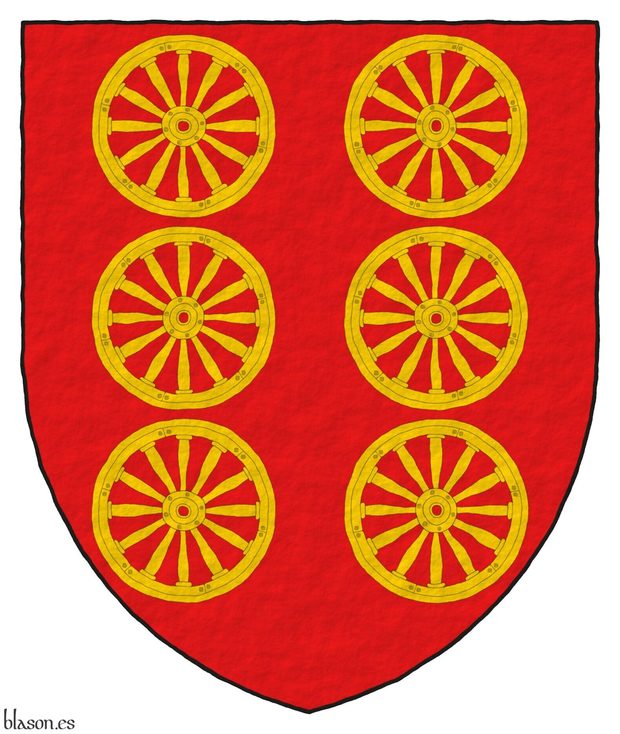
Gules, six wagon-wheels Or, 2, 2, and 2.
Escudo de gules, seis ruedas de carro de oro, 3 y 3.
I have always thought that they are canting arms because of the similar sounds between «rodelo», «rodar»~«rolling», and «rueda»~«wheel».
The expression «Heralds don’t pun – they cant» is itself a form of wordplay. At first glance, one might think that «cant» derives from «can’t», meaning that heralds cannot make puns. However, in heraldry, «cant» refers to the practice of creating a coat of arms that visually alludes to the bearer’s name, surname, or sometimes to a toponym. Such arms are known as «canting arms» ~ «armas parlantes» in Castilian. For example, if one were to design a coat of arms for someone named Megan Fox, and considering that the name Megan derives from Margaret, meaning «pearl» in Greek, a possible canting design could include a fox surrounded by a bordure of pearls. In this sense, canting arms represent the heraldic equivalent of verbal wordplay. Thus, «heralds do not pun — they cant».
Blazon keywords: Gules, Six, Wagon-wheel and Or.
Style keywords: Outlined in sable, Plain tincture and Pointed.
Classification: Lineage, Interpreted, Canting and Coat of arms.
Bearer: Rodelo lineage from Galicia.


Sosa-Garcia, Rodolfo
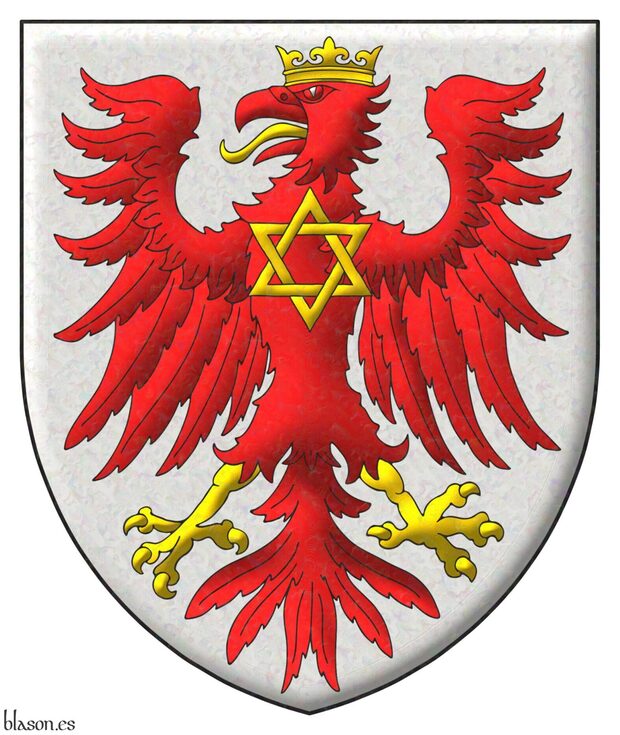
Zurich, Switzerland.
Argent, an eagle displayed Gules, crowned, langued, membered and armed, charged on its chest with a mullet of six points voided, and interlaced Or.
Escudo de plata, un águila de gules, coronada, lampasada, membrada y armada, cargada en su pecho de una estrella de seis puntas, hueca y entrelazada todo de oro.
Illuminated with lights and shadows and with a iridescent finish.
Another version of this blazon «Argent, a eagle displayed Gules, crowned, langued, membered and armed, charged on its chest with a star of David Or».
Blazon keywords: Without divisions, Argent, One, Eagle, Gules, Crowned, Langued, Membered, Armed, Charged, Mullet, Six, Base (lower 1/3), Voided, Interlaced and Or.
Style keywords: Iridescent (nacar), Outlined in sable, Illuminated and Pointed.
Classification: Personal and Created.
Bearer: Sosa-Garcia, Rodolfo.


Standard of Rui J. Vaz
Heraldic device depicted by me, in flat tinctures, outlined in Sable, shown as tilted shield, with a semi-circular external shape and with a leather finish.
This is the heraldic standard of Rui J. Vaz's family, US, emblazoned by me. Structure: Coat of arms; Badge; 1st line of the motto «Audacia,Veritas»; Crest; 2nd line of the motto «et Libertas»; Badge.
Blazon keywords: Azure, Gules, Argent, Or, One, Six, Five, Party per pale, Overall, Lion, Rampant, Winged, Grasping, Dexter, Forepaw, Sword, Erect, Crest, Escutcheon, Quarterly, Garuda, Sejant, Castle, Triple-towered, Masoned, Pallet, Plate and Motto.
Style keywords: Tilted shield, Outlined in sable, Plain tincture, Semi-circular and Leather.
Classification: Personal, Interpreted, Boa, Standard and Flag.
Bearer: Vaz, Rui J..


Tercio Alessandro Farnese
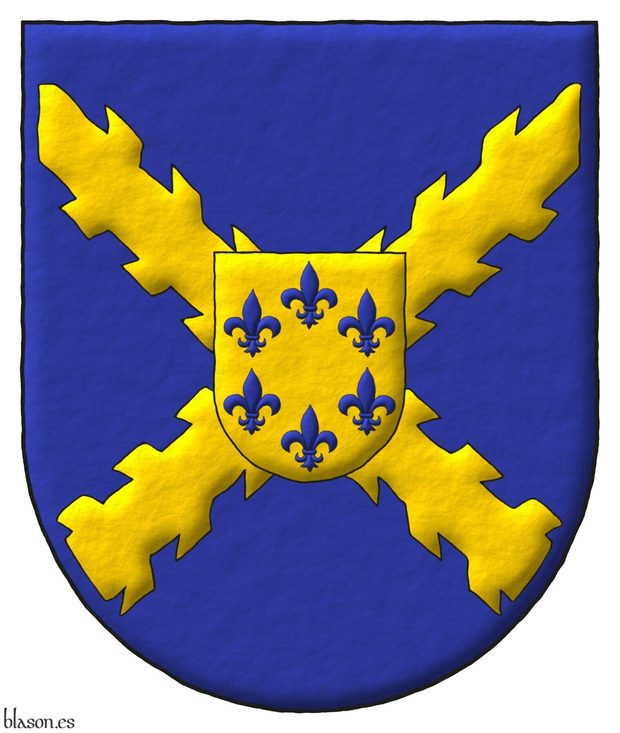
Azure, a cross of Burgundy Or; an inescutcheon Or, six fleurs de lis in orle Azure.
Escudo de azur, una cruz de Borgoña de oro; un escusón de oro, seis flores de lis en orla de azur.
Coat of arms interpreted by me, illuminated with lights and shadows, contoured in Sable, with a semi-circular external shape and with a freehand finishing.
Coat of arms of the Tercio Alessandro Farnese, 4th of the Spanish Legion, emblazoned by me. In honor of Alessandro Farnese, the central inescutcheon bears in orle the 6 fleurs de lis of the Farnese family.
Blazon keywords: Azure, Or, One, Six, Cross of Burgundy, Cross couped, Inescutcheon, Fleur de lis and In orle.
Style keywords: Outlined in sable, Illuminated, Semi-circular and Freehand.
Classification: Military, Interpreted, Boa and Coat of arms.
Bearer: Tercio Alessandro Farnese.


Vittorio Gifra compared to con Almorrabides of Navarre
Almorrabides of Navarre Or, three Pallets Azure.
Paly of six Azure and Or; over all a bend Azure.
For this comparison I make the optical illusion as if the coat of arms of Almorrabides de Navarra was Azure, instead of being Or, and the Pallets Or, instead of being Azure. Para esta comparación hago el juego visual como si el escudo de Almorrabides de Navarra fuera de Azur, en vez de ser de Oro, y que los palos que sobresalen iluminados son los de Oro, en vez de ser los de Azur.
Blazon keywords: Paly, Six, Azure, Or, Surmounted, Overall (deprecated), Bend, Without divisions, Three and Pale.
Style keywords: Semi-circular, Freehand, Illuminated and Outlined in sable.
Classification: Coat of arms, Interpreted, Personal and Kingdom of Navarre.
Bearer: Gifra, Vittorio.
-
Language
-
Categories of heraldry
-
Divisions of the field
- Without divisions
- Party per pale
- Party per fess
- Party per bend
- Party per bend sinister
- Tierce
- Tierce sinister
- Tierced per pale
- Tierced per fess
- Tierced per bend
- Tierced pallwise inverted
- Quarterly
- Quarterly per saltire
- Gyronny
- Party per fess, the chief per pale
- Party per pale, the sinister per fess
- Party per fess, the base per pale
- Party per pale, the dexter per fess
- Chapé
- Chaussé
- Embrassé
- Contre-embrassé
- Party per chevron
- Enté
- Enté en point
- Flanched
-
Metals
-
Colours
-
Furs
-
Other tinctures
-
Ordinaries and sub-ordinaries
-
Diminutives of the ordinaries
-
Geometric charges
-
Composite ordinaries
-
Inanimate charges from Nature
Atom, Crescent, Diamond, Emerald, Estoile, Increscent, Lightning flash, Moon, Mount, Mullet, Mullet of four points, Orbital, Plough of Ursa Major, Rainbow, Ray of the sun, River, Sea, Snowflake, Sun, Sun in splendour, Sun of May, Terrestrial globe, Trimount, Water and Wave.
-
Vegetal charges from Nature
Acorn, Apple, Apple tree, Ash, Bluebonnet, Camellia, Chrysanthemum, Cinquefoil, Cornflower, Dogwood flower, Double rose, Eguzki-lore, Elm, Fleur de lis, Flower, Gourd, Holm oak, Hop cone, Indian paintbrush, Kapok tree, Laurel, Lily, Linden, Lotus flower, Madonna lily, Mexican cedar tree, Oak, Olive tree, Palm tree, Plantain plant, Pomegranate, Poplar leaf, Rose, Shamrock, Sunflower, Thistle, Tree, Tulip, Vine and Wheat.
-
Animal charges from Nature
Badger, Bald eagle, Barbel, Barn owl, Bear, Beaver, Bee, Beetle, Bighorn sheep, Binson, Blackbird, Boar, Brach hound, Bull, Cow, Doe, Dog, Dolphin, Dove, Eagle, Elephant, Falcon, Female figure, Fish, Flame, Fly, Fox, Frog, Goat, Goldfinch, Goose, Heron, Horse, Hummingbird, Jaguar, Lark, Leopard, Lion, Lion passant, Lion rampant guardant, Lioness, Lynx, Male figure, Martlet, Merino ram, Owl, Panther, Parrot, Peacock, Pelican, Pelican in her piety, Pronghorn, Puffin, Quetzal, Raven, Roe deer, Rooster, Savage, Seagull, Serpent, She-wolf, Stag, Starling, Talbot, Turtle, Tyger, Vulture, Warren hound and Wolf.
-
Parts of natural charges
Arm, Beak, Branch, Caboshed, Chest, Claw, Covert, Dorsal fin, Eagle claw, Ear of wheat, Ermine spot, Escallop, Feather, Foot (palmiped), Foreleg, Forepaw, Hand, Head, Heart, Hoof, Leaf, Neck, Ostrich feather, Palm frond, Paw, Roe deers' attires, Shoulder, Sprig, Stags' attires, Stem, Swallow-tail, Tail, Tail addorsed, Tail fin, Talon, Tibia, Tooth, Trunk, Trunk (elephant), Two hands clasped, Two wings in vol, Udder, Wing and Wrist.
-
Artificial charges
Ace of spades, Anchor, Anvil, Arch, Arm vambraced, Armillary sphere, Arrow, Axe, Bell, Bell tower, Beret, Bonfire, Book, Bookmark, Bow, Branding iron, Bridge, Broken, Buckle, Cannon, Cannon dismounted, Cannon port, Canopy roof, Carbuncle, Castle, Celtic Trinity knot, Chain, Chess rooks, Church, Clarion, Clay pot, Closed book, Club, Column, Comb, Compass rose, Conductor's baton, Cord, Covered cup, Crozier, Crucible, Cuffed, Cup, Cyclamor, Dagger, Displayed scroll, Double vajra, Drum, Ecclesiastical cap, Fanon, Federschwert, Fleam, Four crescents joined millsailwise, Galician granary, Garb, Gauntlet, Geometric solid, Grenade, Halberd, Hammer, Harp, Host, Hourglass, Key, Key ward, Knight, Knot, Lantern, Letter, Line, Loincloth, Maunch, Menorah, Millrind, Millstone, Millwheel, Monstrance, Mortar, Mullet of six points pierced, Nail, Non-classic artifact, Norman ship, Number, Oar, Oil lamp, Open book, Page, Pair of pliers, Pair of scales, Parchment, Pestle, Piano, Pilgrim's staff, Plough share, Polish winged hussar, Port, Portcullis, Potent, Quill, Ribbon, Rosette of acanthus leaves, Sabre, Sackbut, Sail, Scroll, Scythe, Sheaf of tobacco, Ship, Skirt, Spear, Spear's head, Stairway, Star of David, Step, Sword, Symbol, Tetrahedron, Torch, Tower, Trident, Trumpet, Turret, Two-handed sword, Wagon-wheel, Water-bouget, Wheel, Winnowing fan and With a turret.
-
Immaterial charges
Angel, Archangel, Basilisk, Dragon, Dragon's head, Garuda, Golden fleece, Griffin, Heart enflamed, Justice, Mermaid, Our Lady of Mercy, Ouroboros, Paschal lamb, Pegasus, Phoenix, Sacred Heart of Jesus, Saint George, Sea-griffin, Sea-lion, Trinity, Triton, Unicorn, Winged hand and Wyvern.
-
External elements
-
Heraldic creations
-
References
-
Formats
-
Keywords on this page
Between, Pointed, Armed, Azure, Boa, Bordure, Overall, Head, Charged, Crest, Five, Tail, Crescent, Quarterly, Outlined in sable, Displayed, Two, In fess, In chief, Coat of arms, Mullet, Fleur de lis, Personal, Gules, Illuminated, Interpreted, Chief, Gyronny, Langued, Motto, Lion, Lineage, Semi-circular, Membered, Or, Beaked, Leather, Argent, Without divisions, Rampant, Religious, Six, Saltire, Grasping, Freehand, One, Twenty-four, Eagle and Bald eagle.

